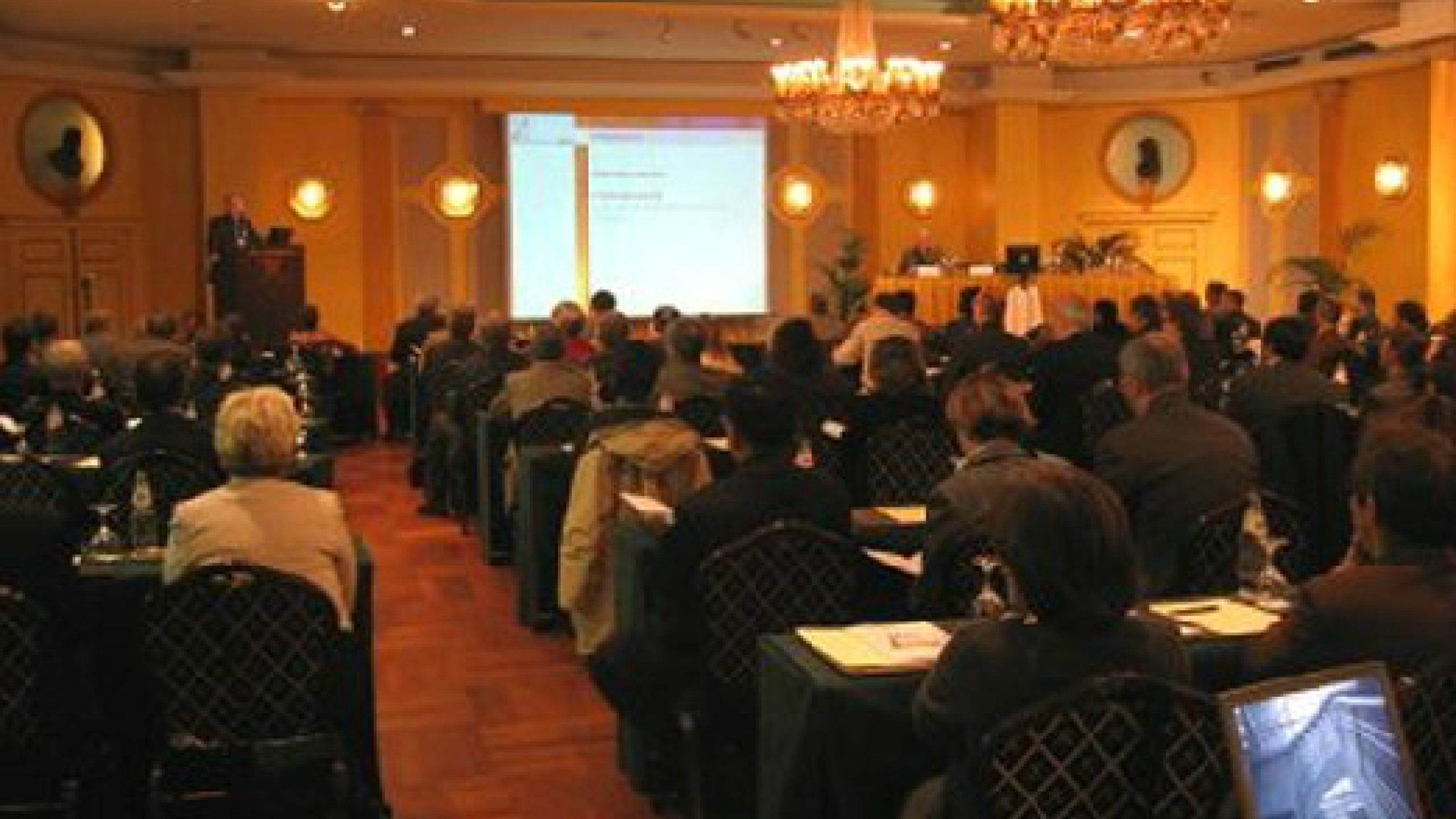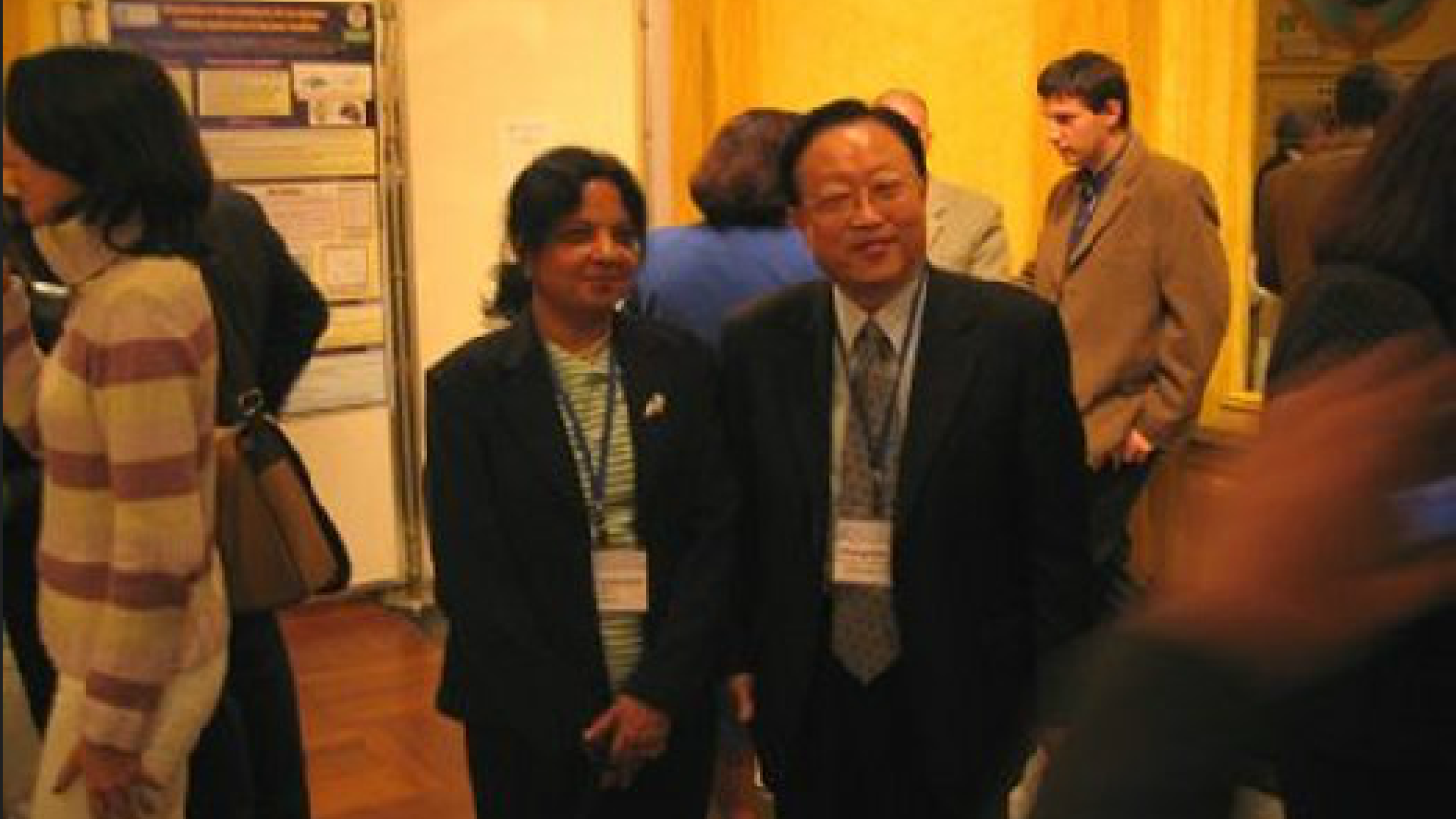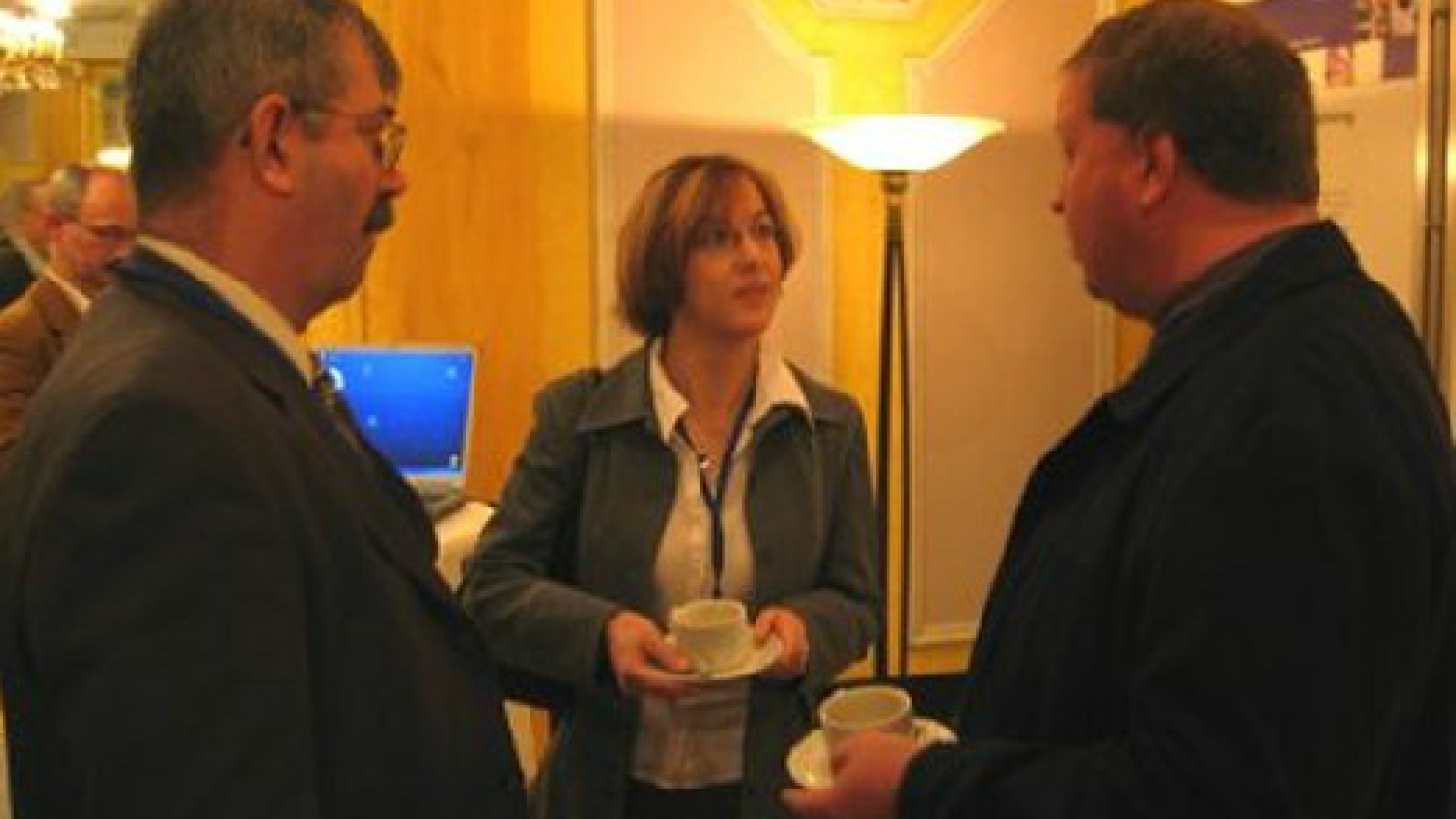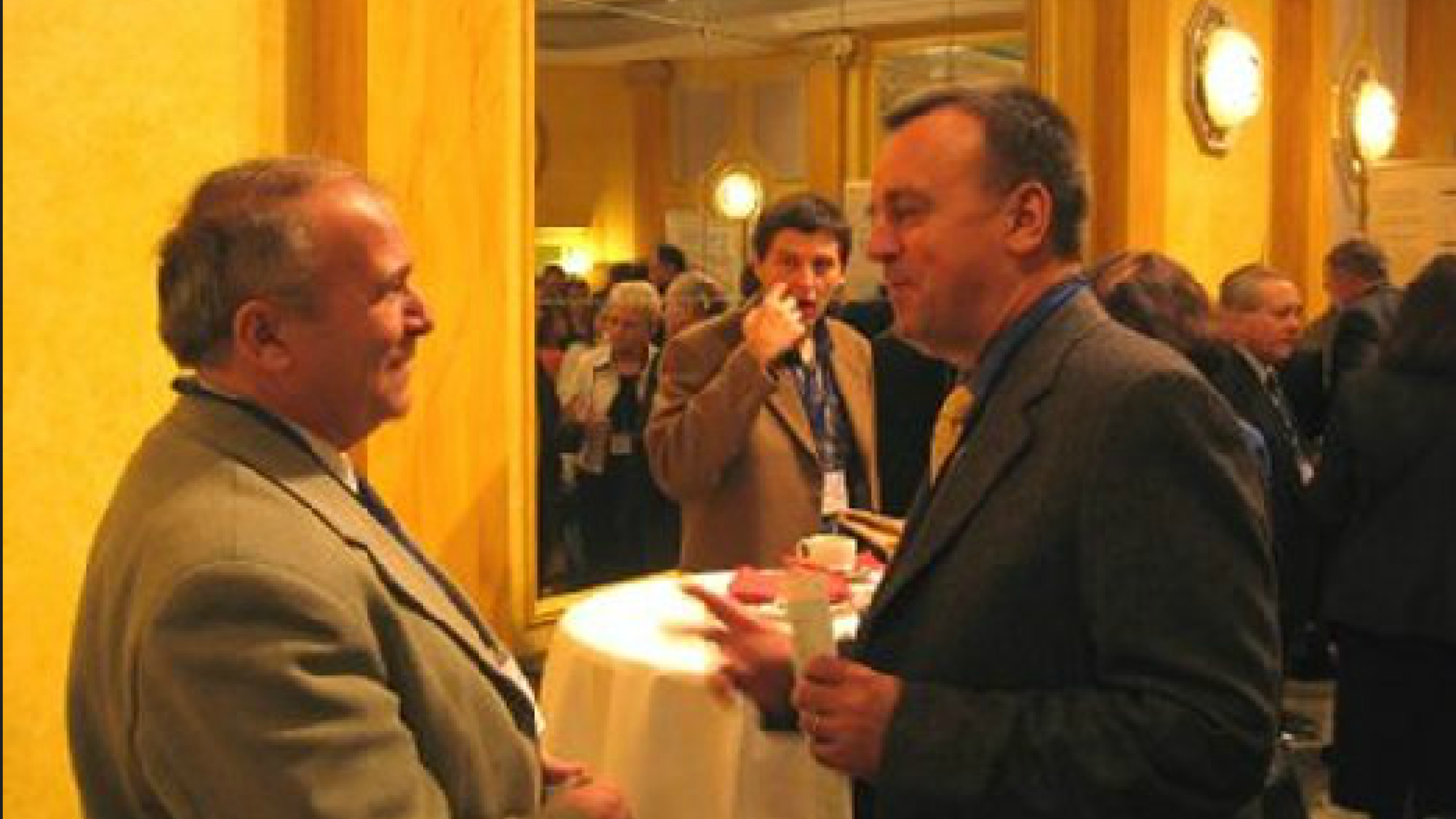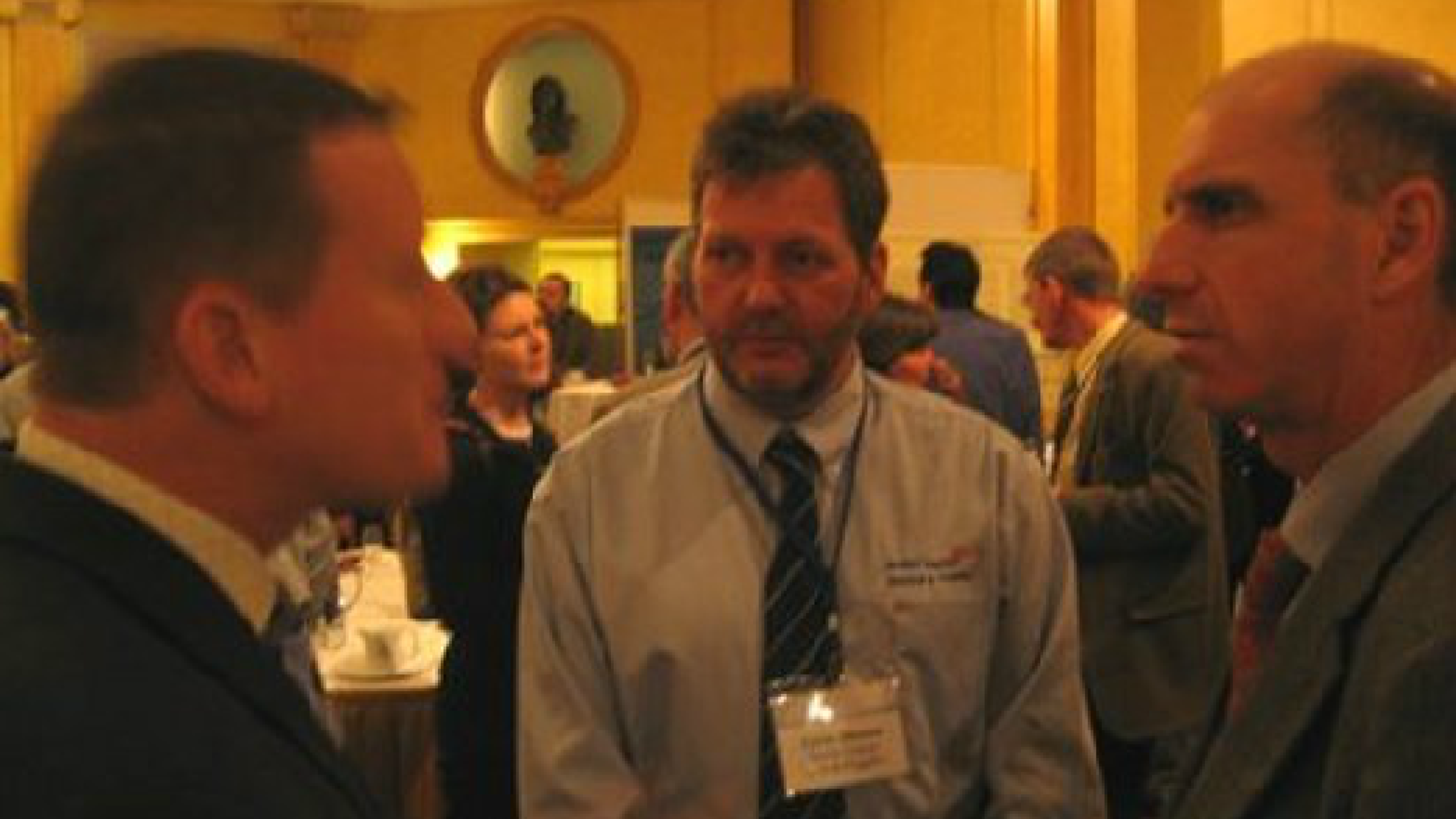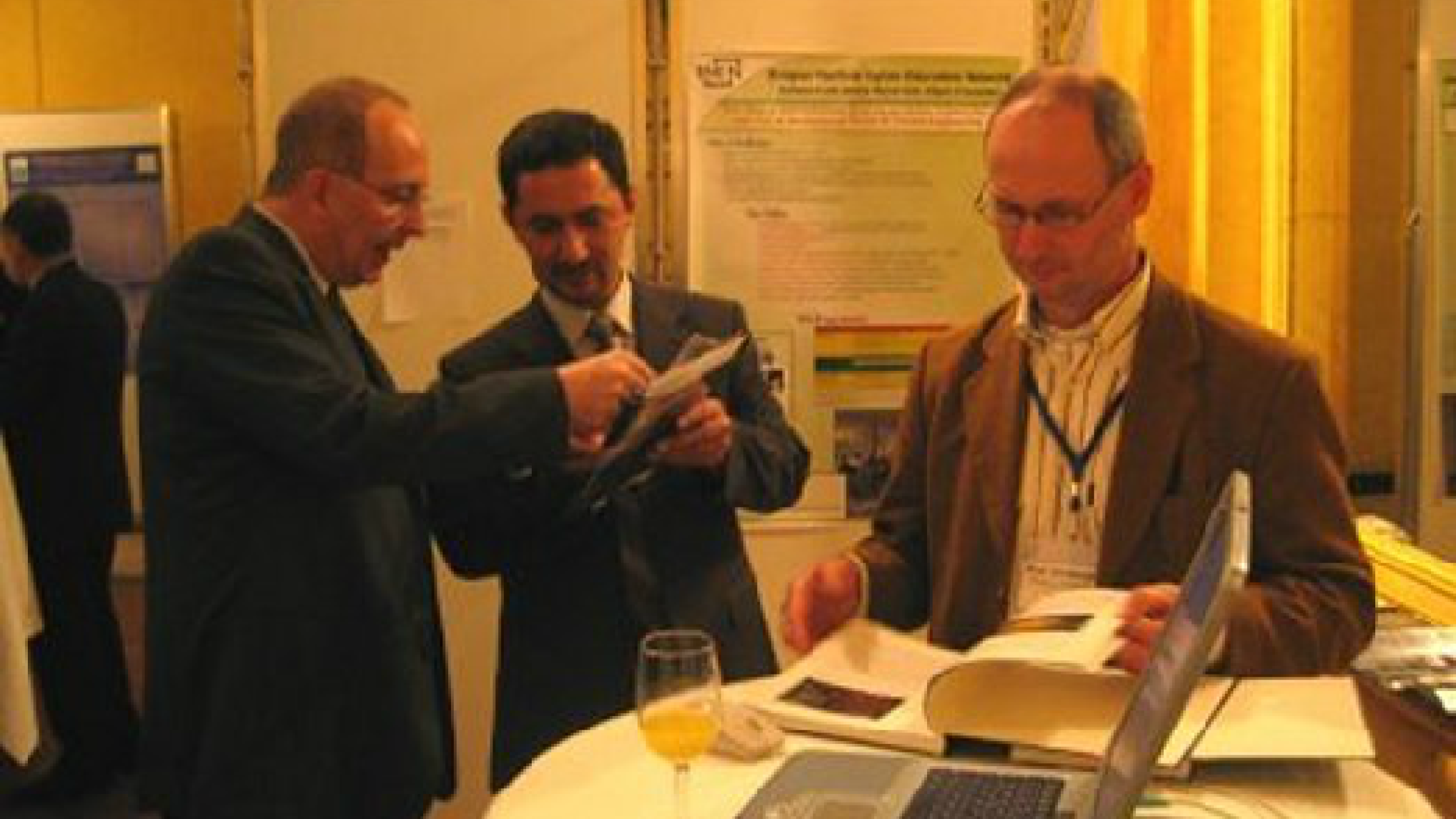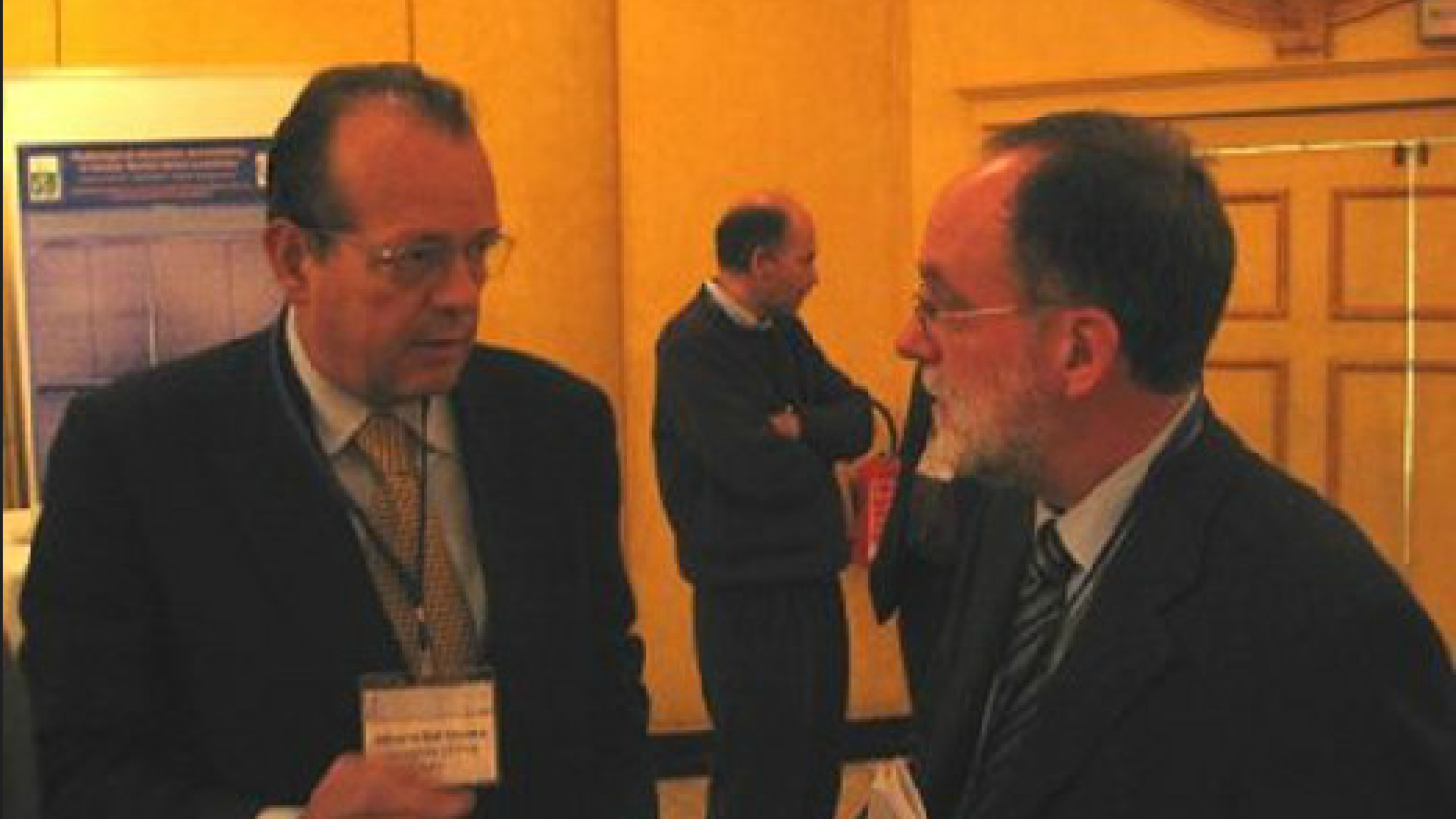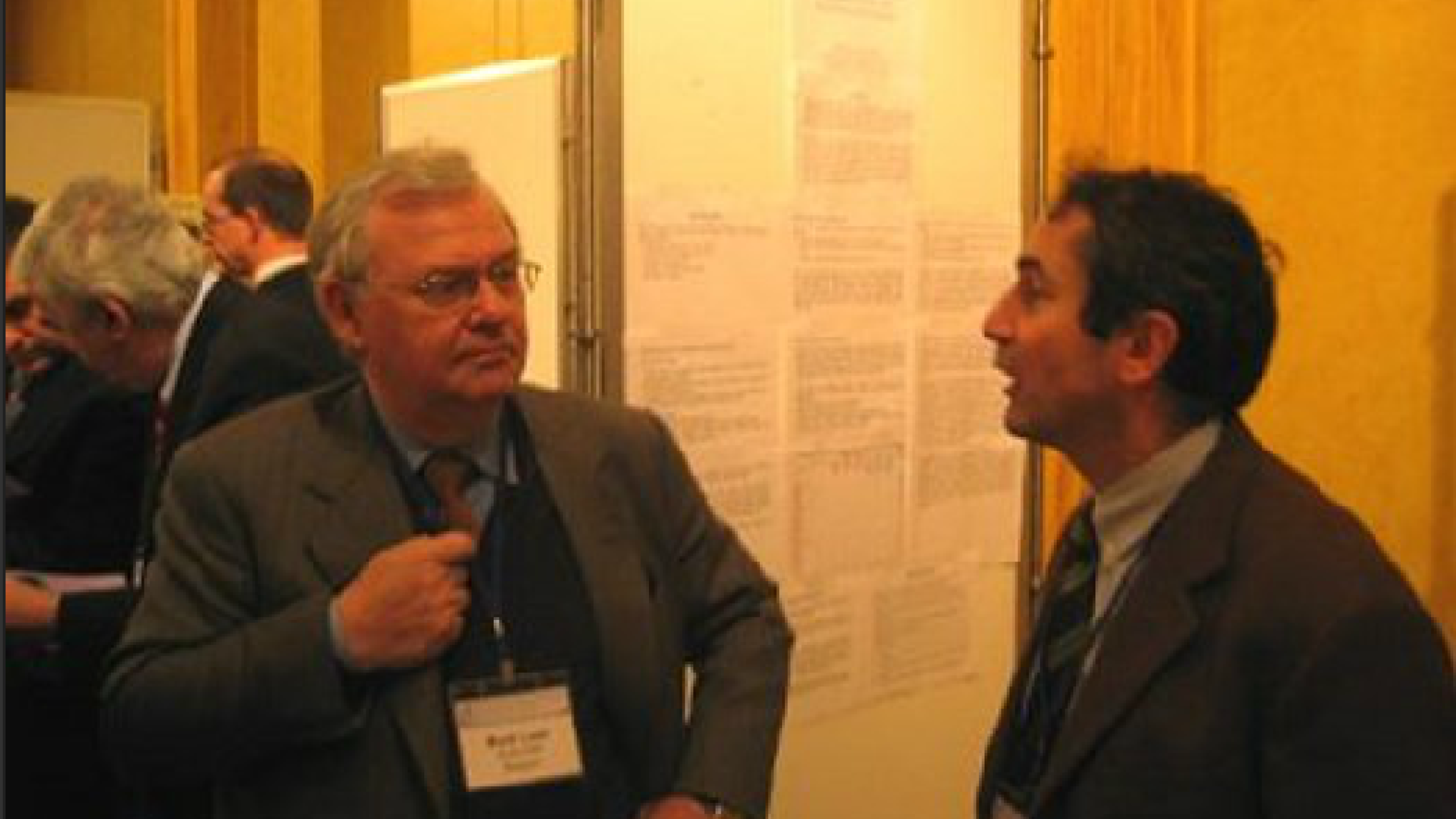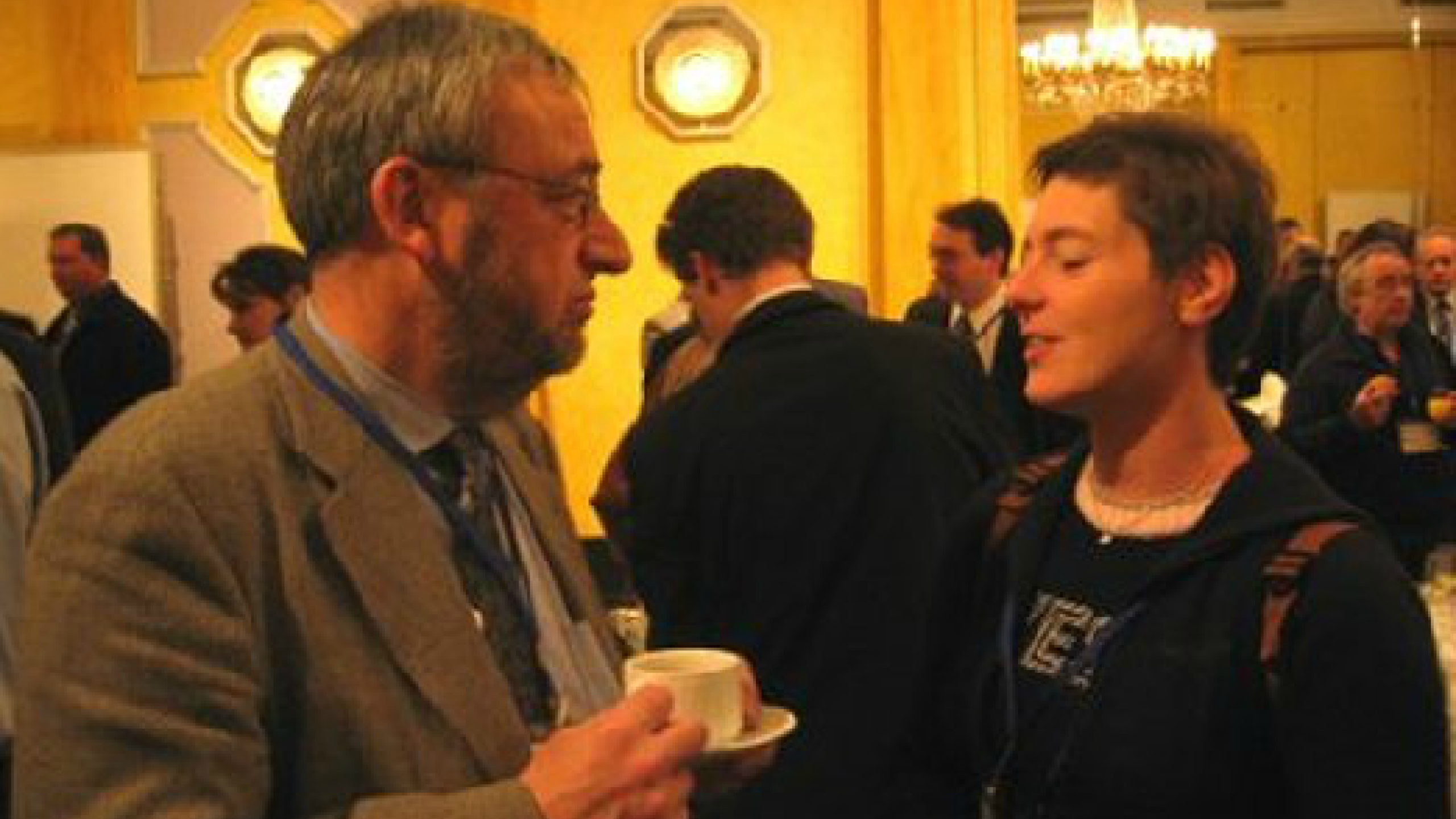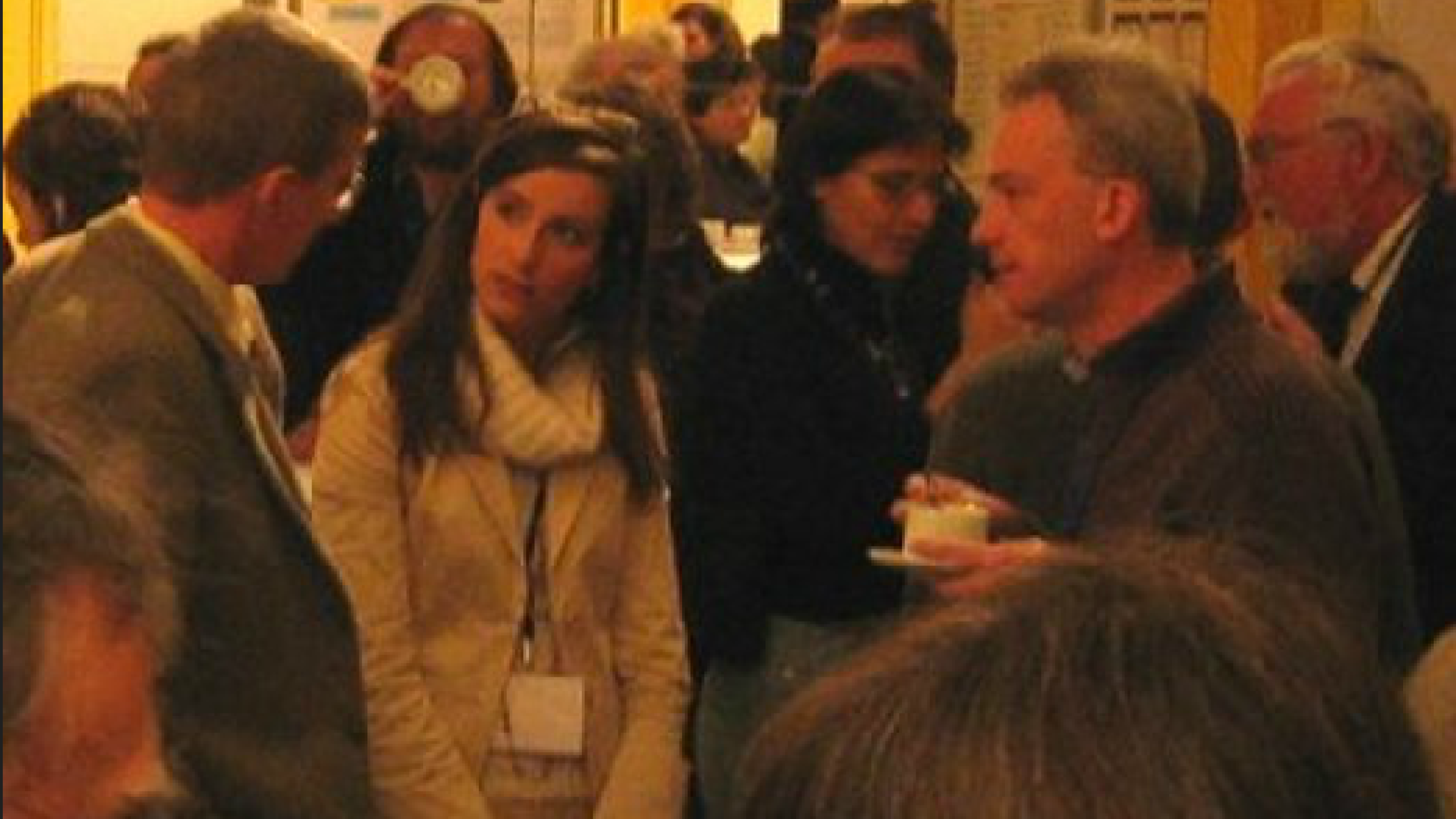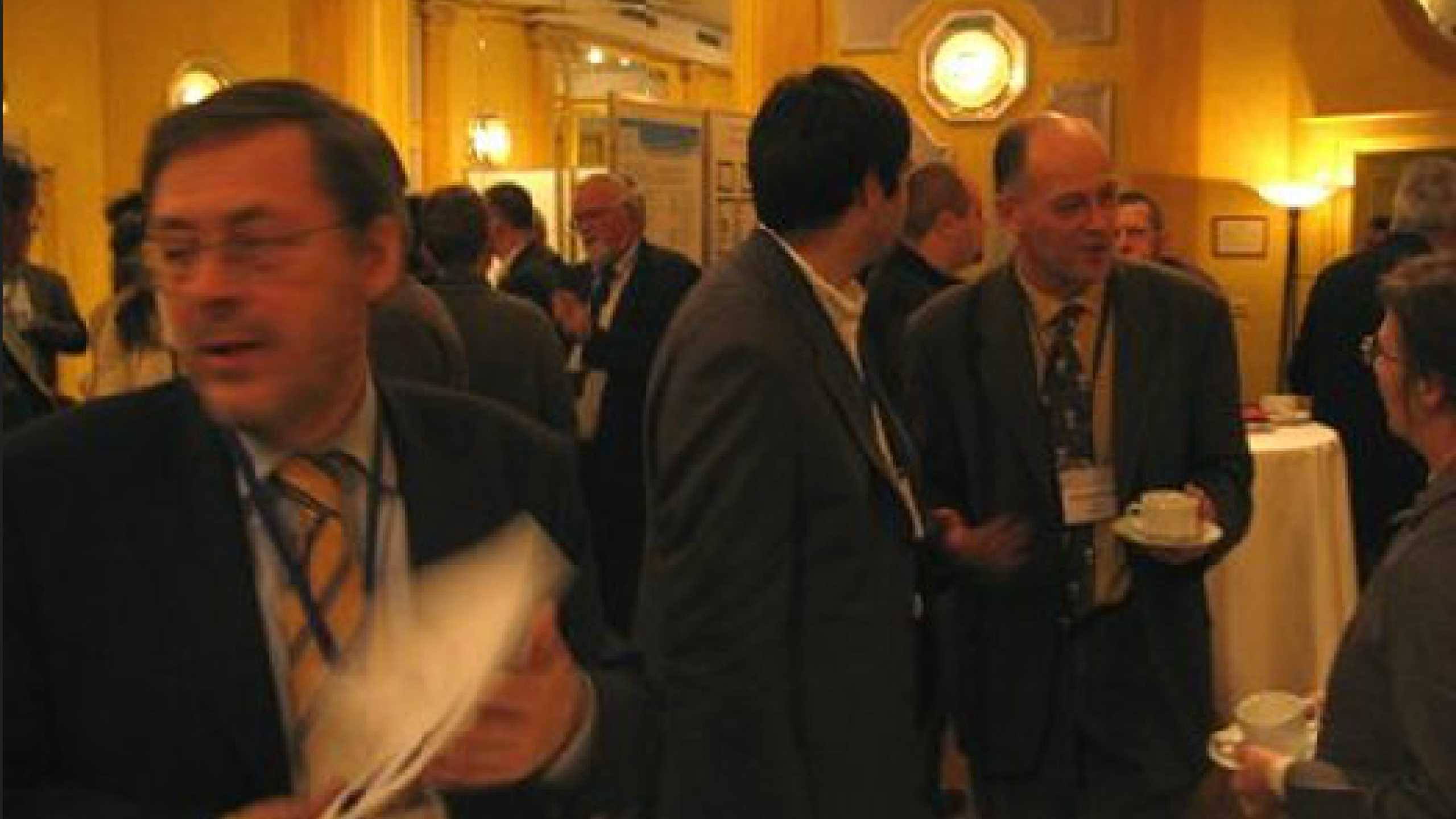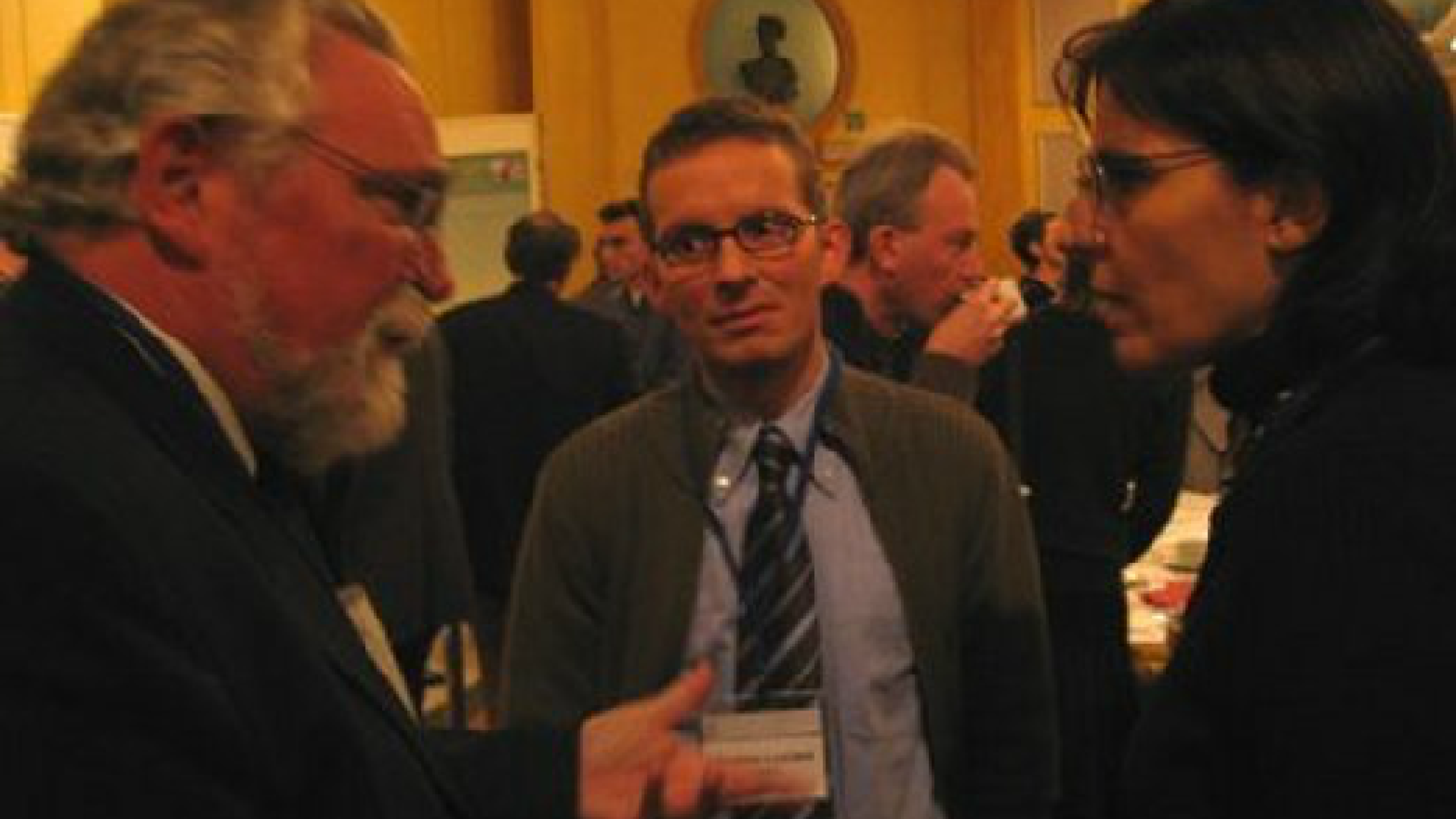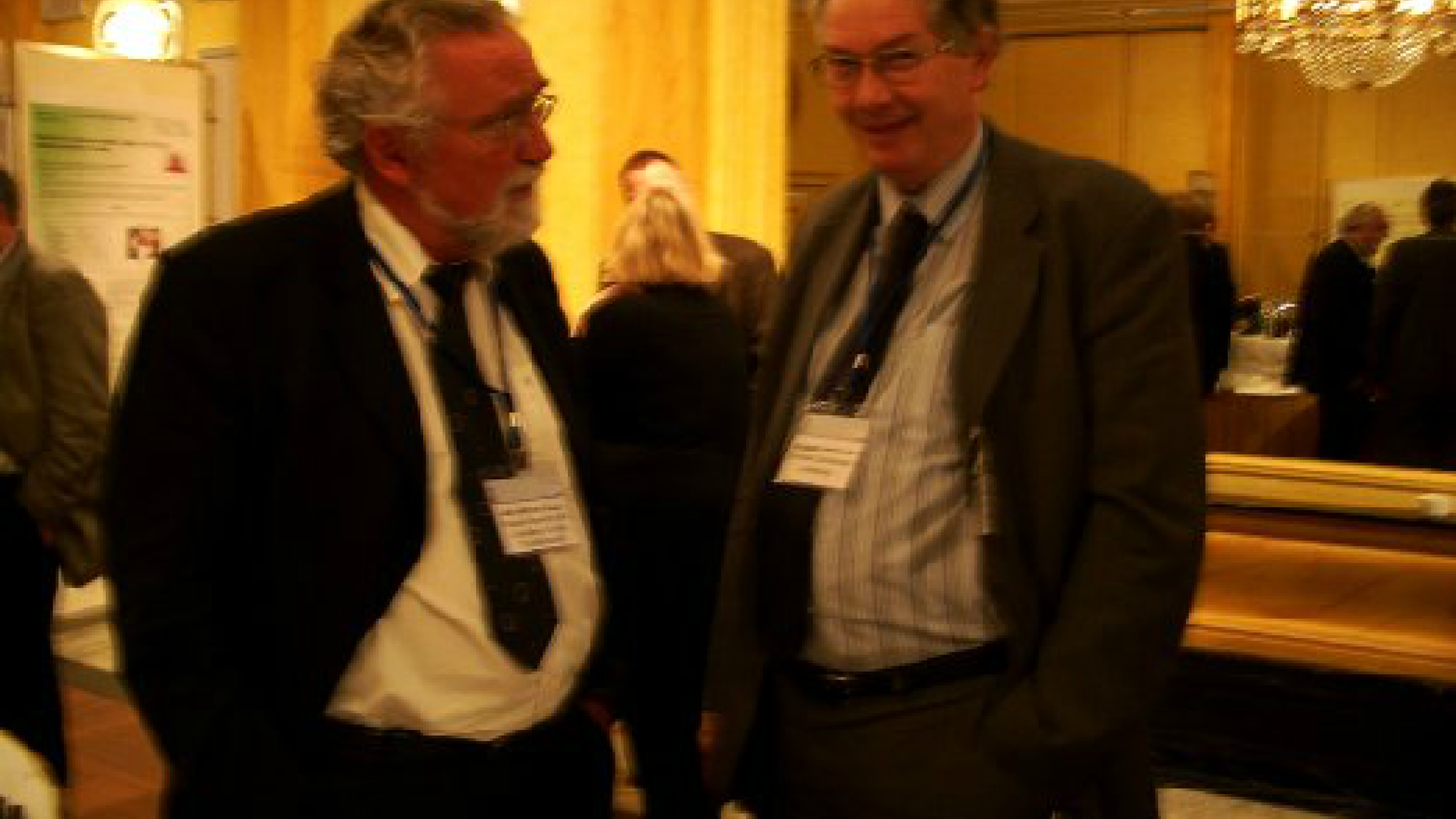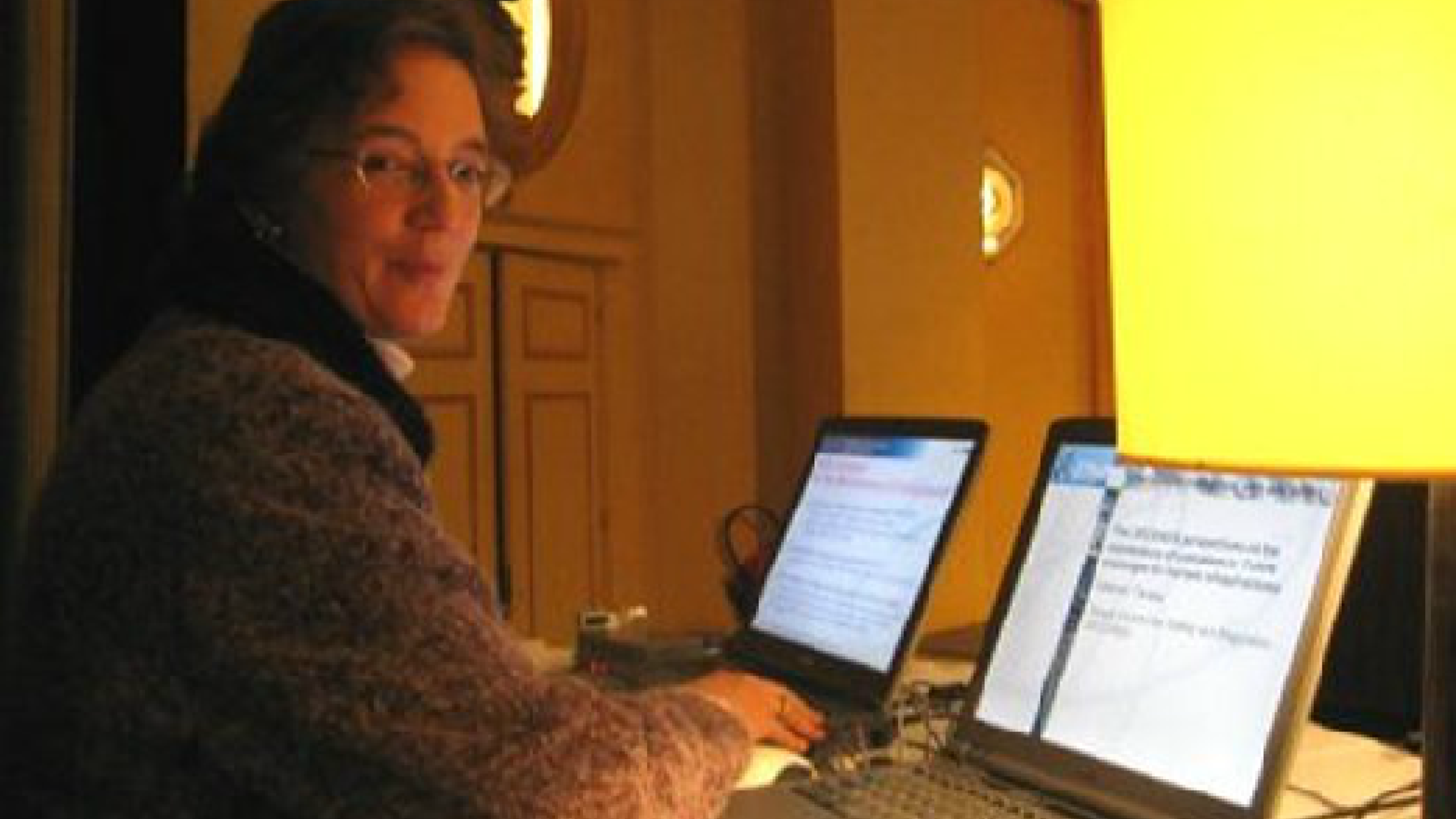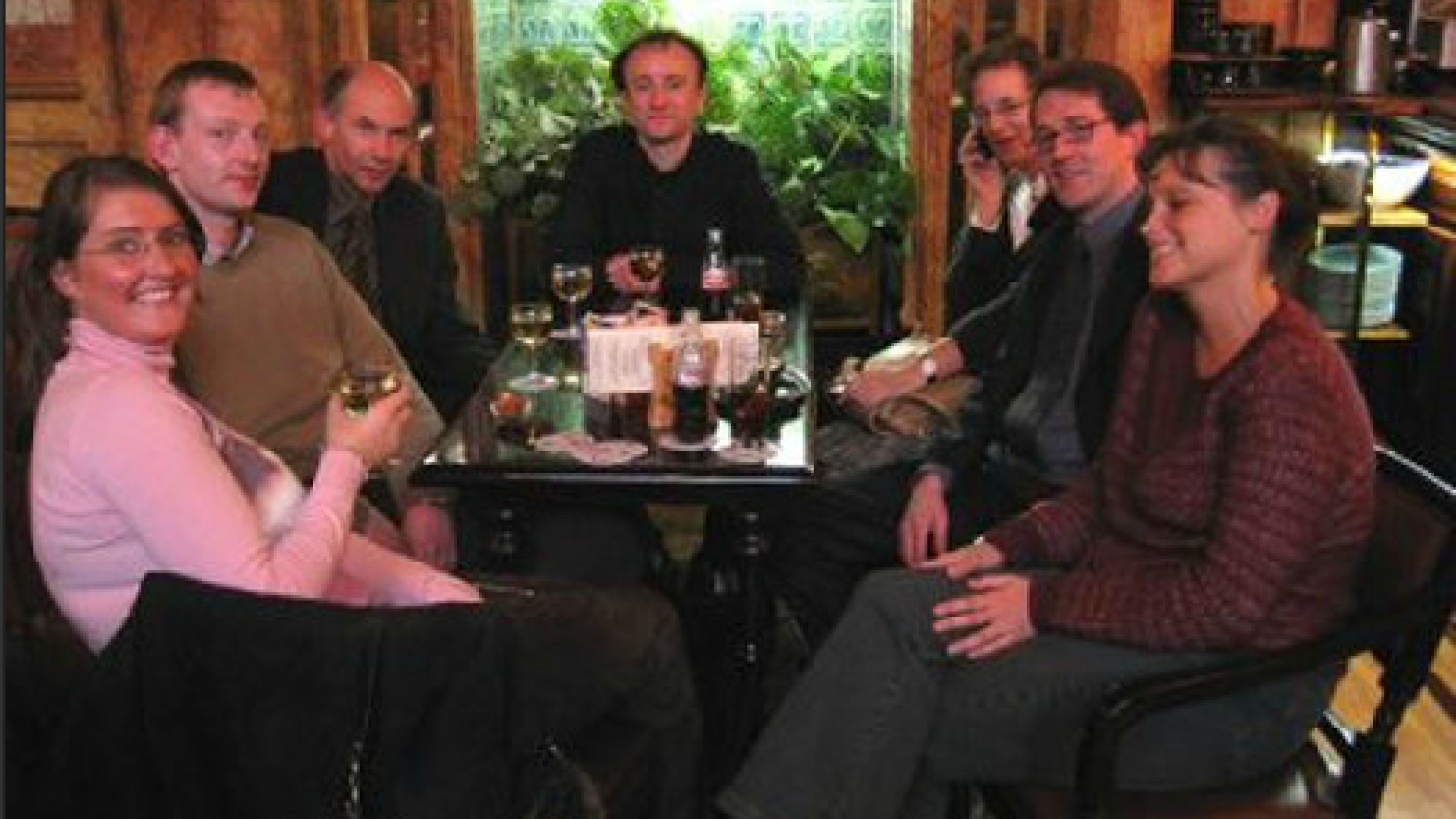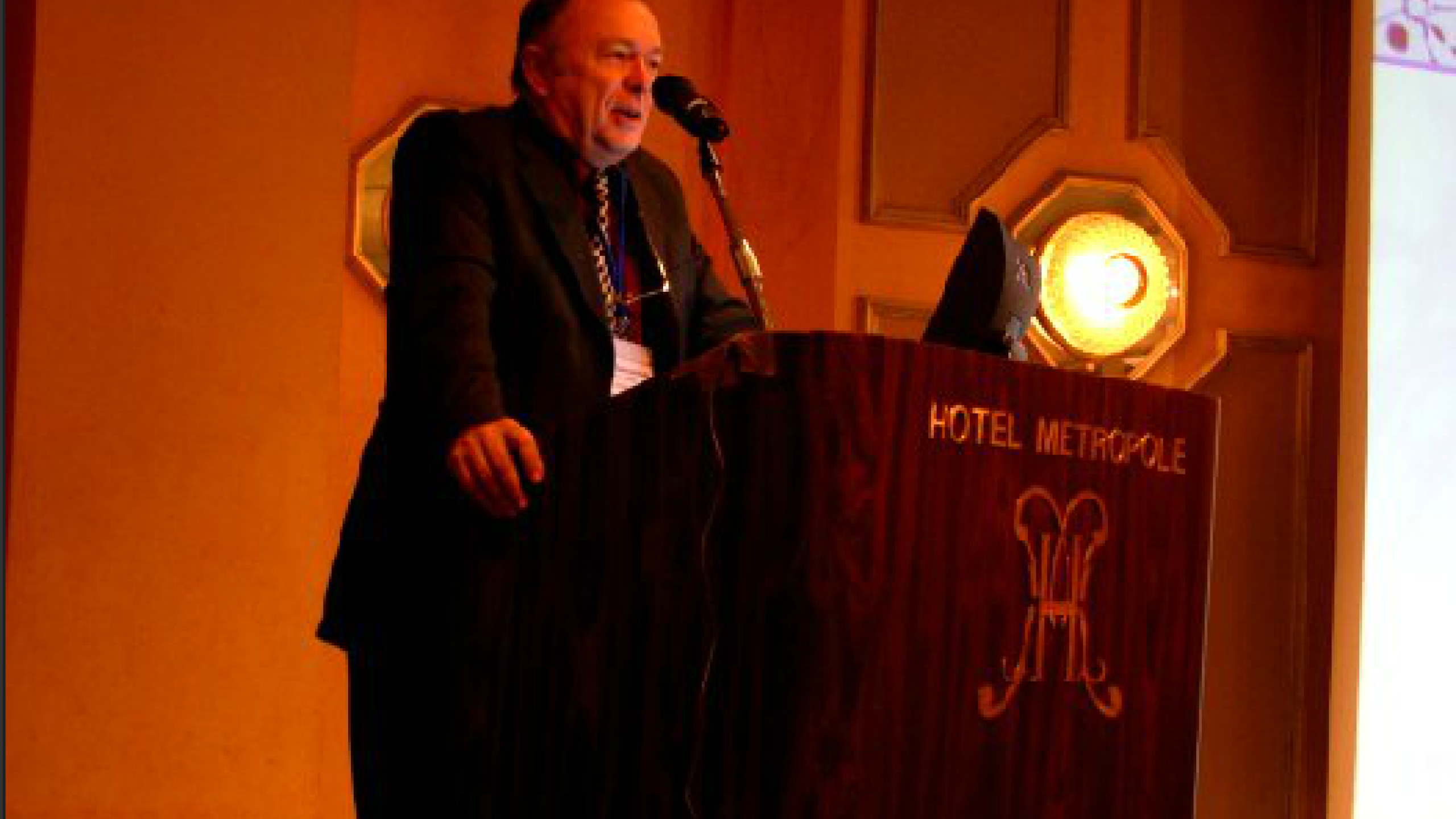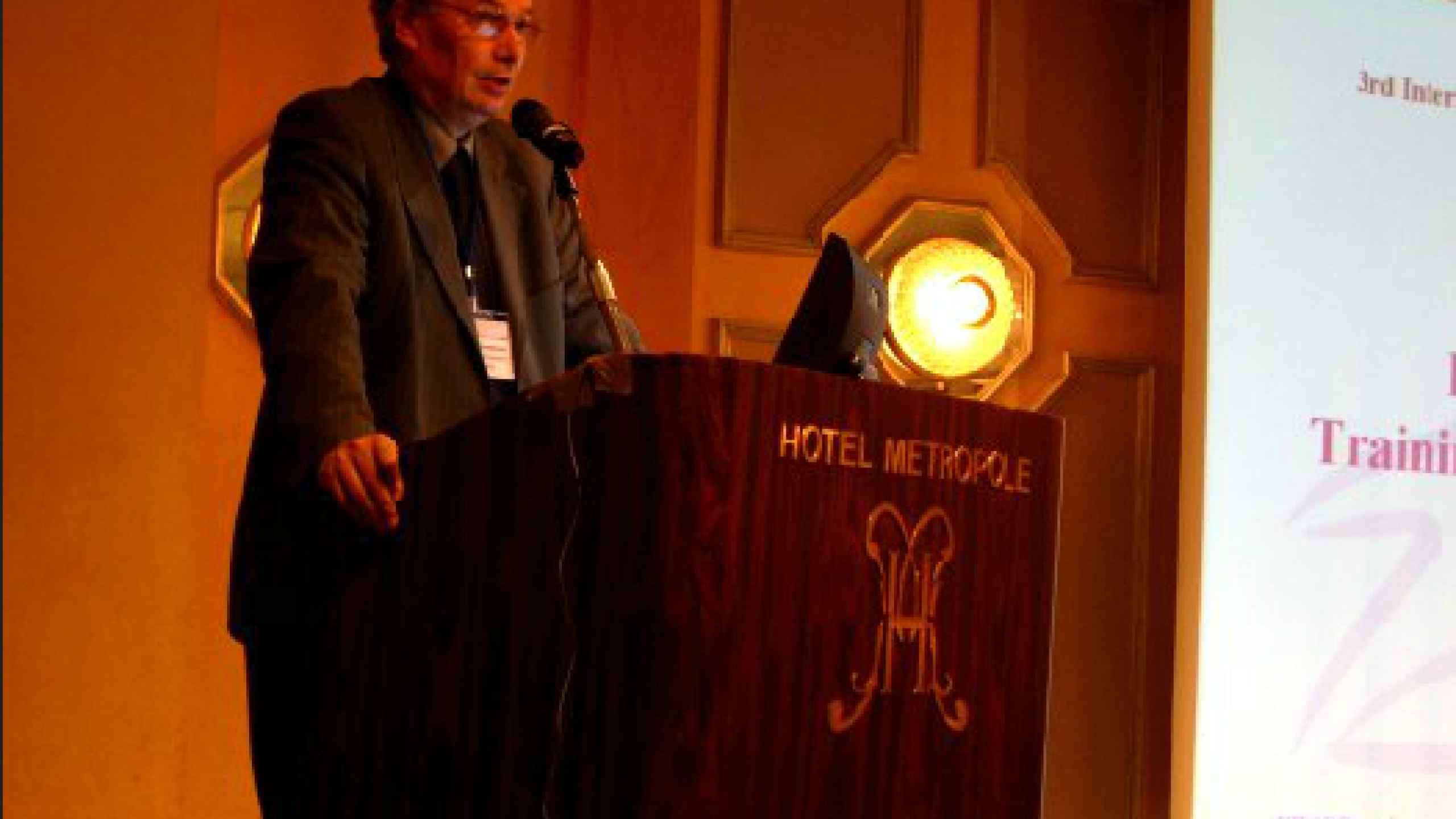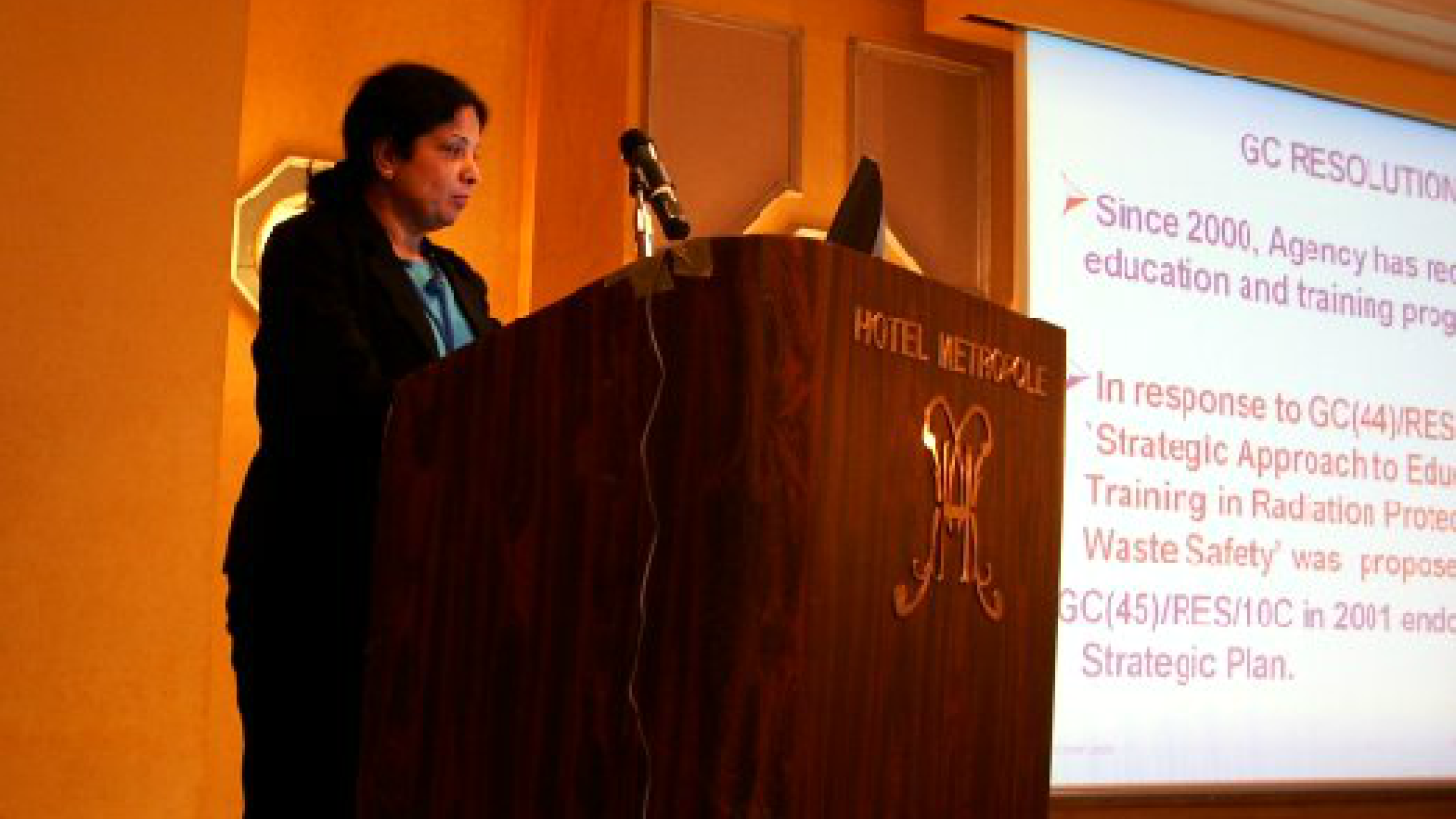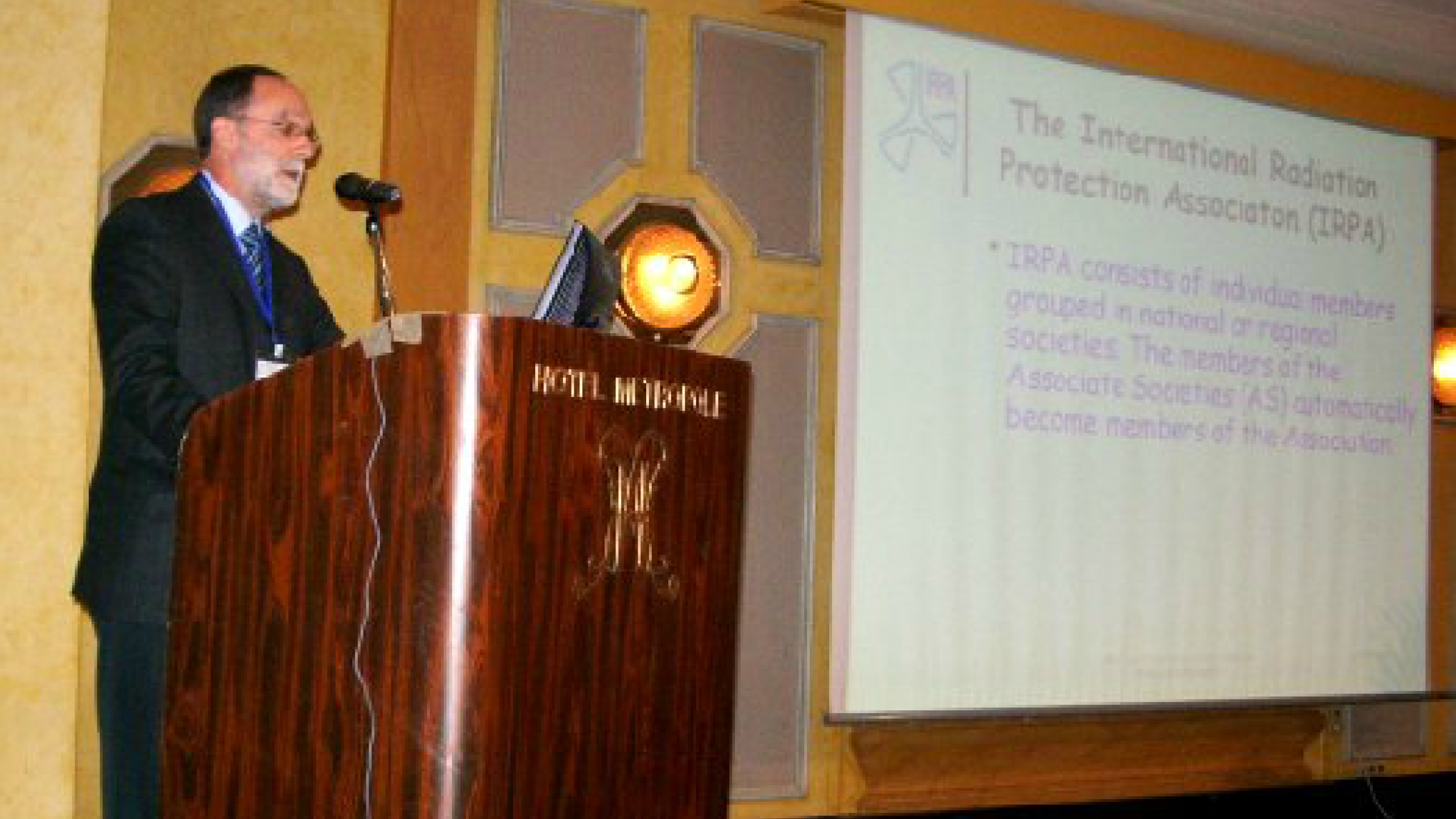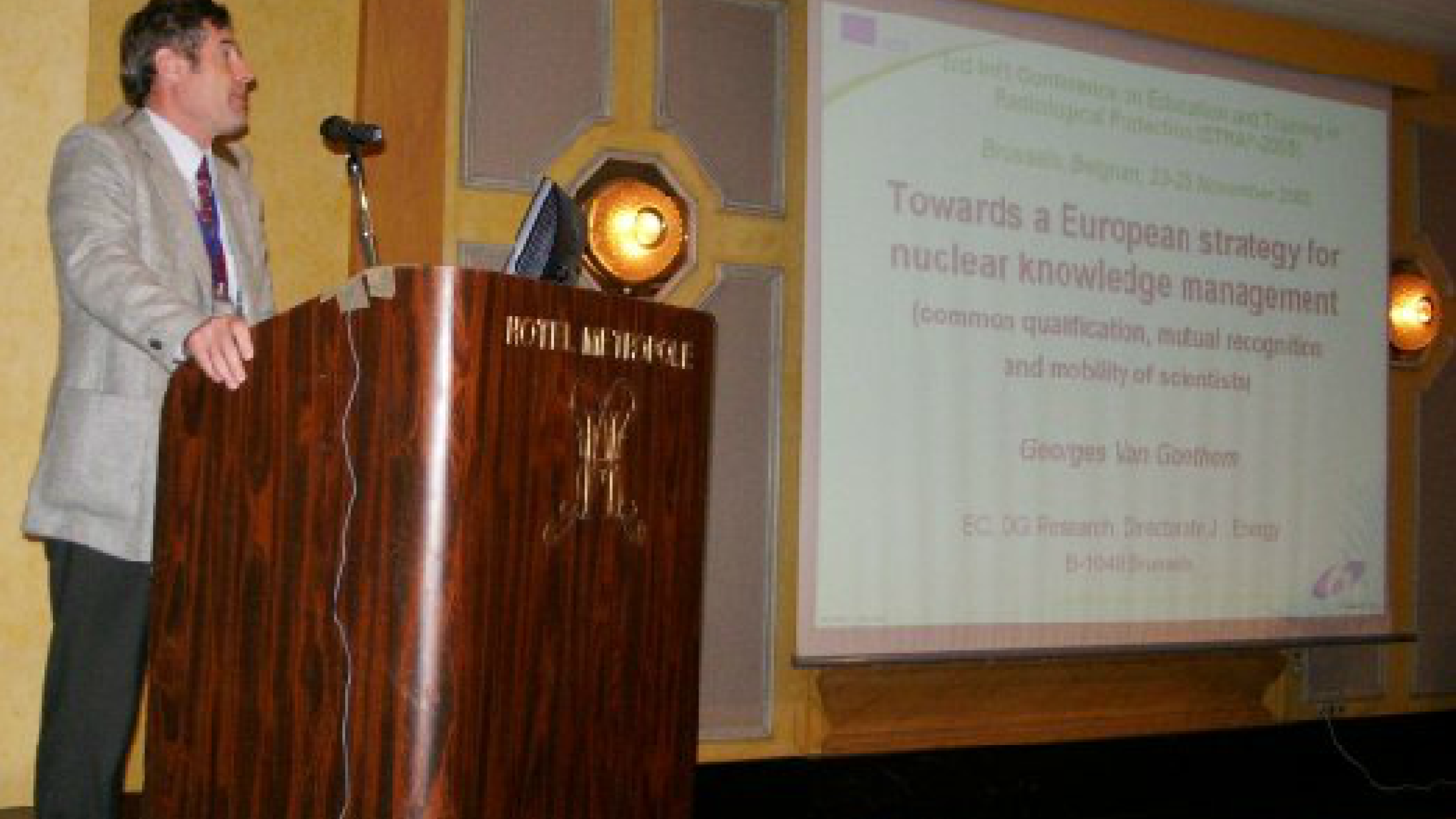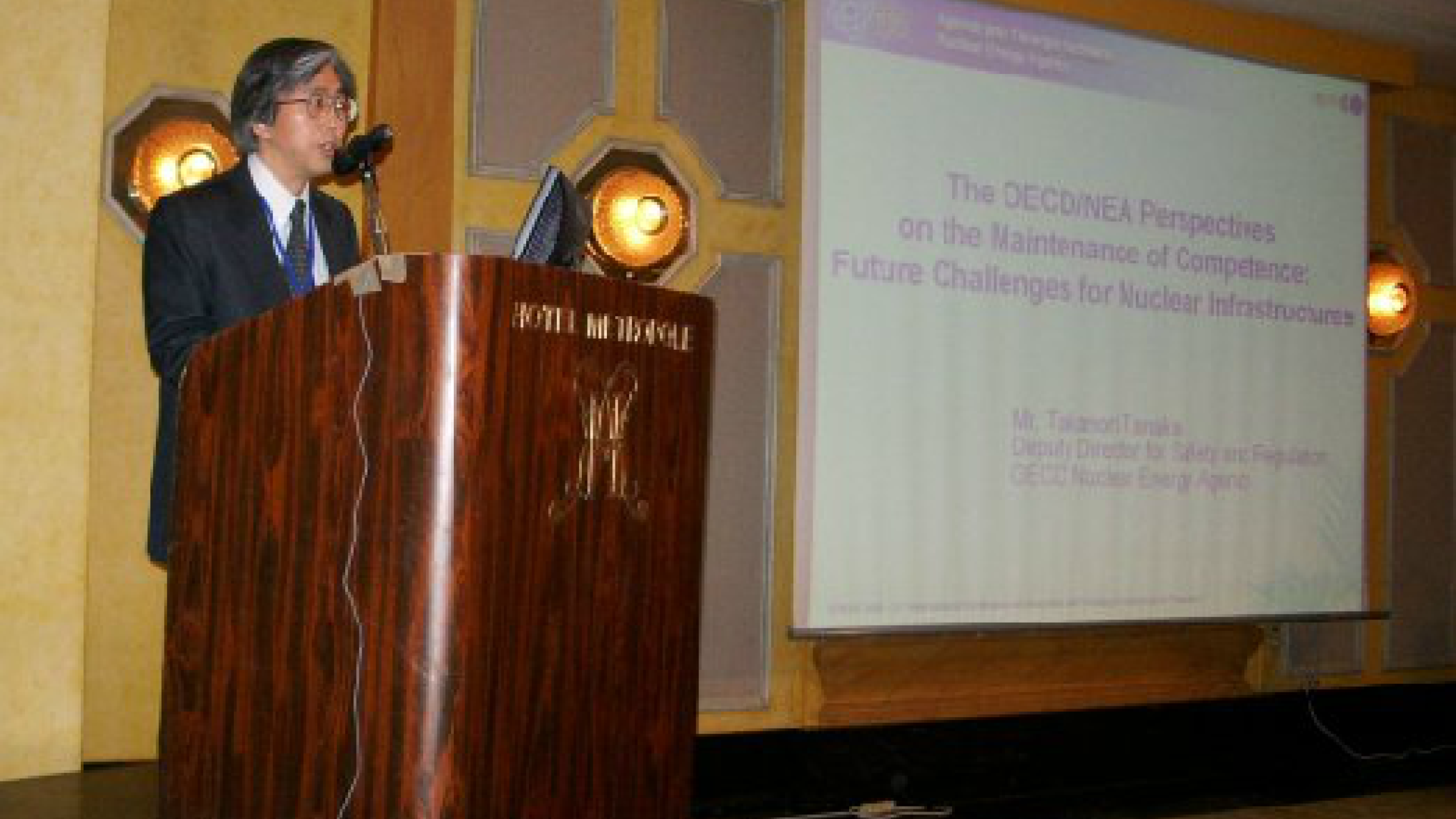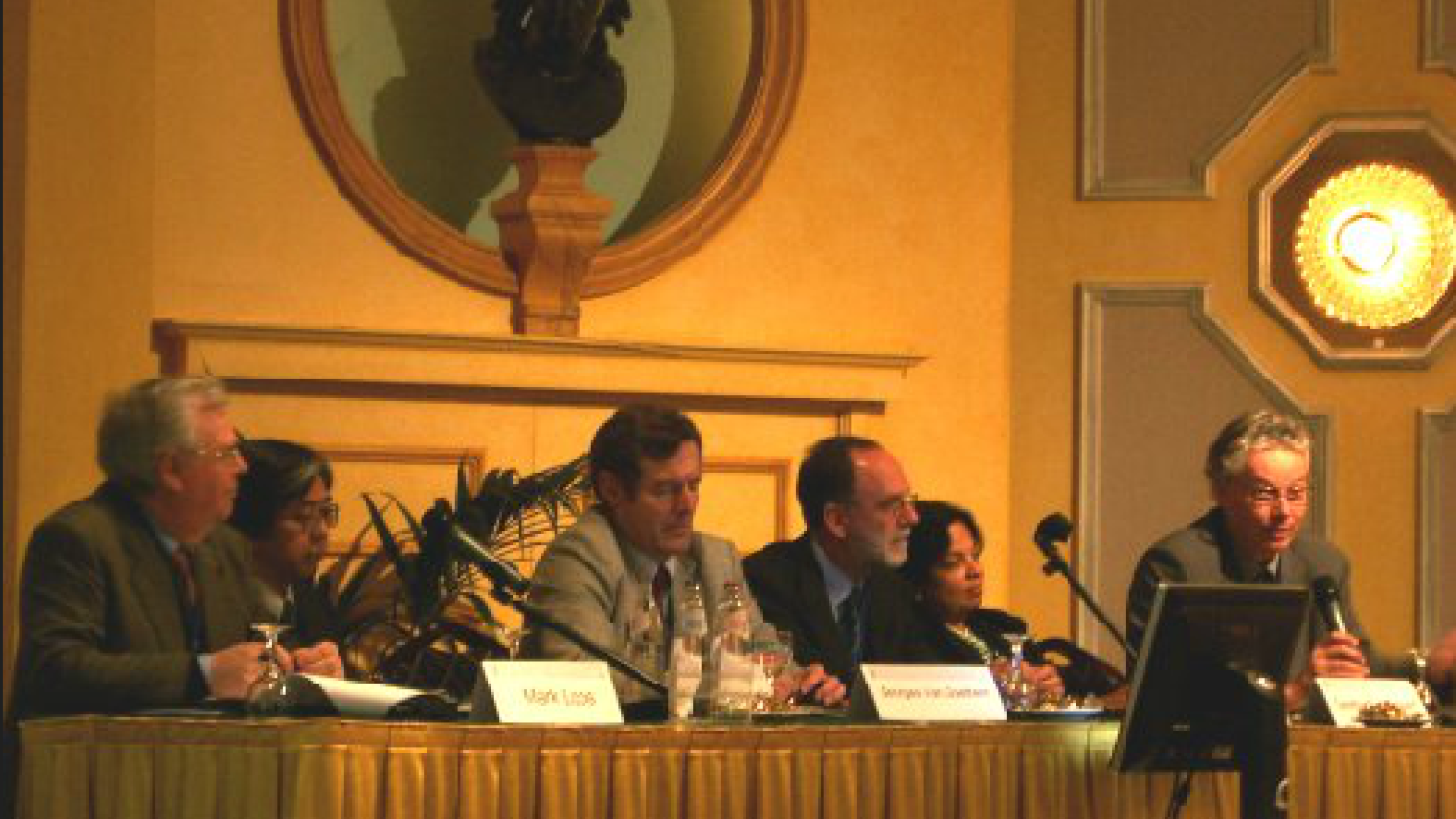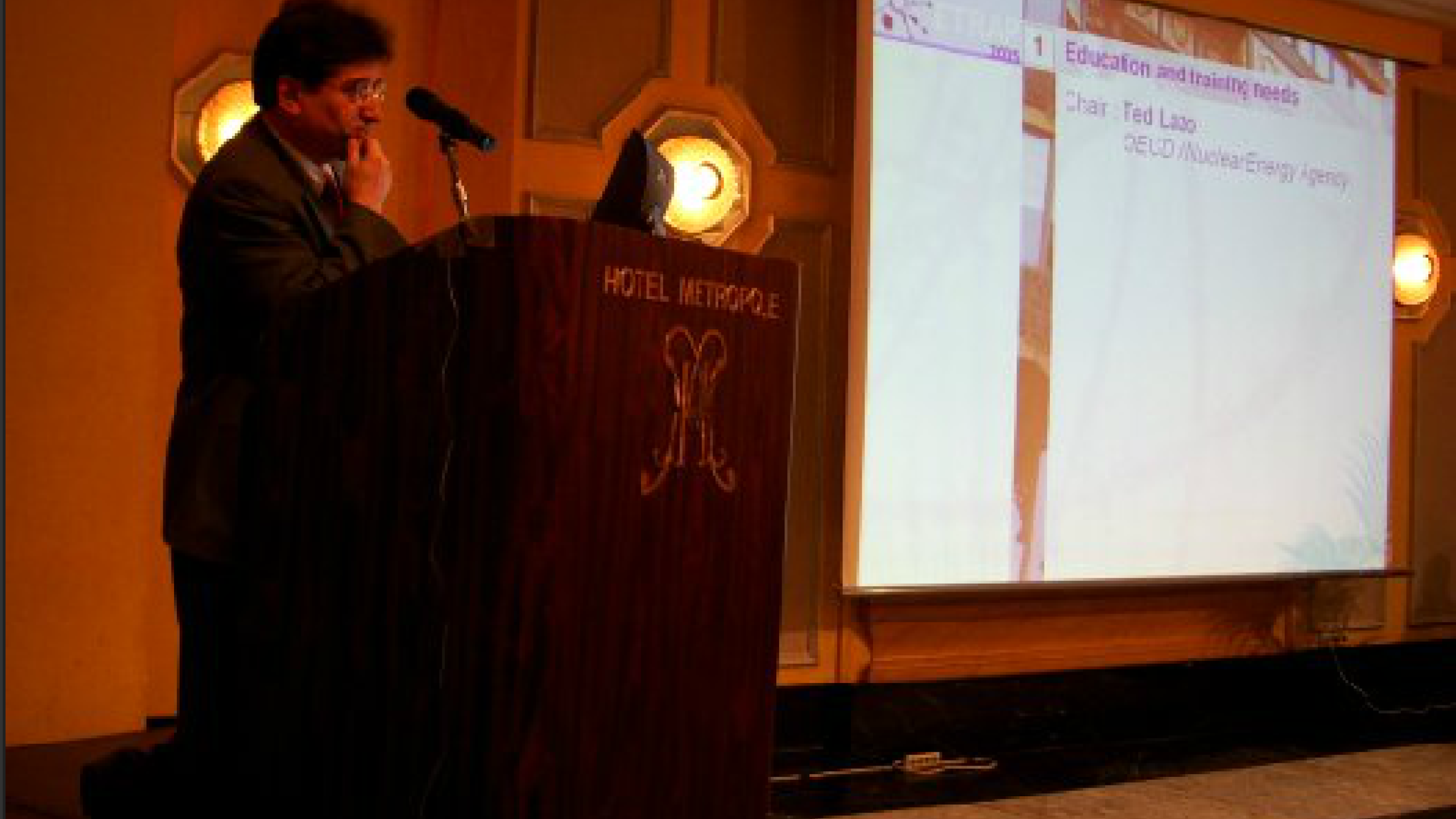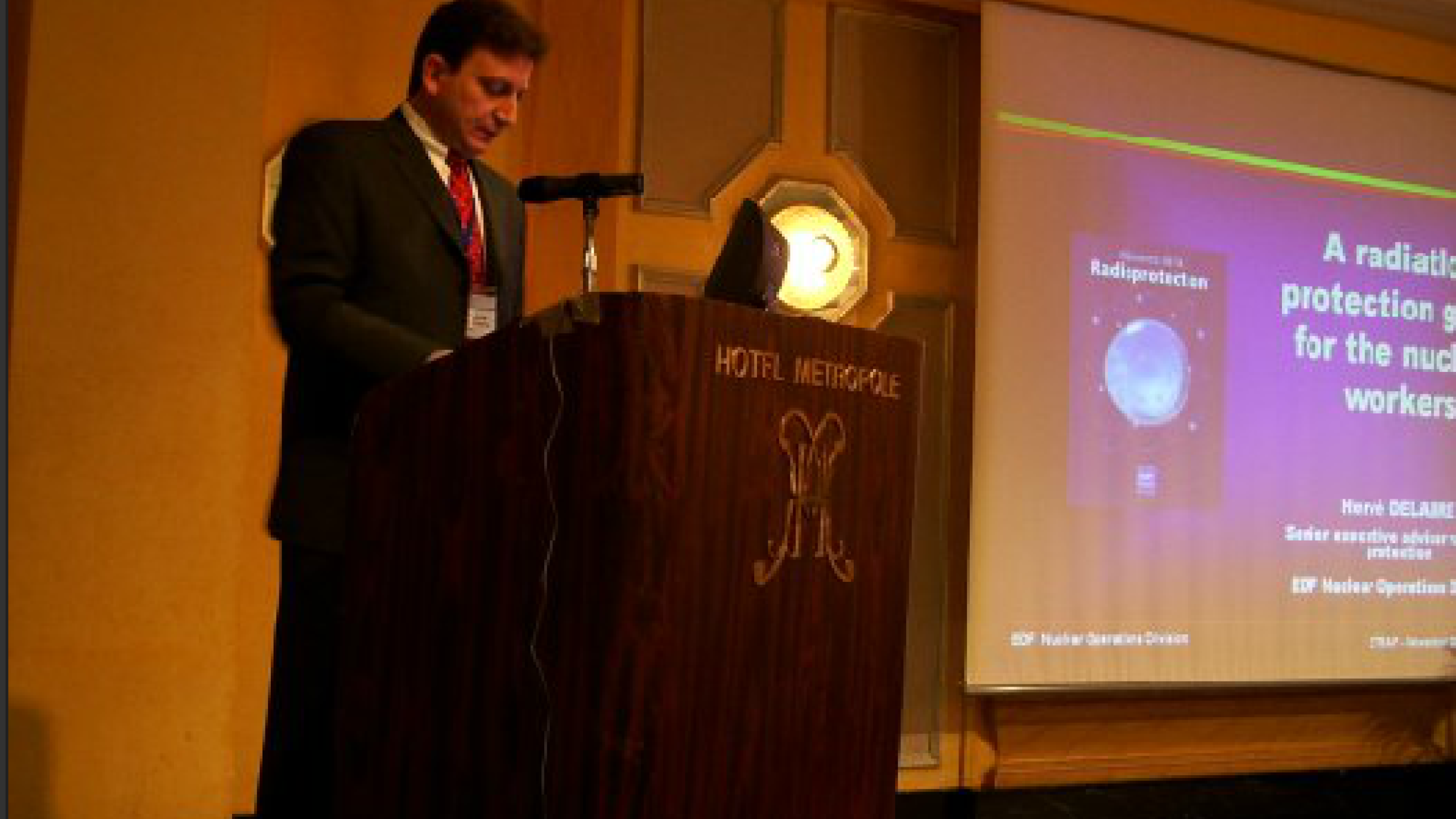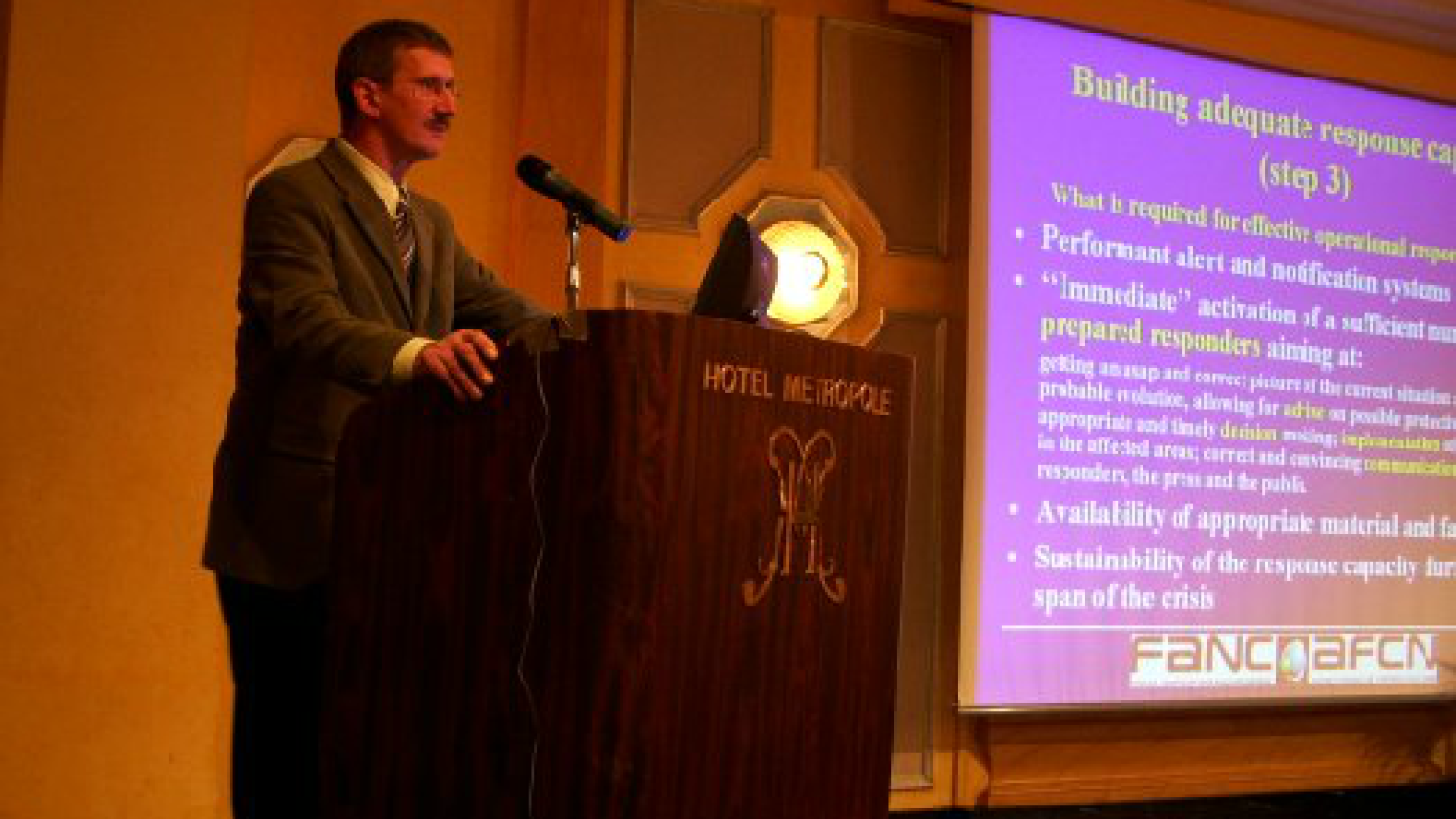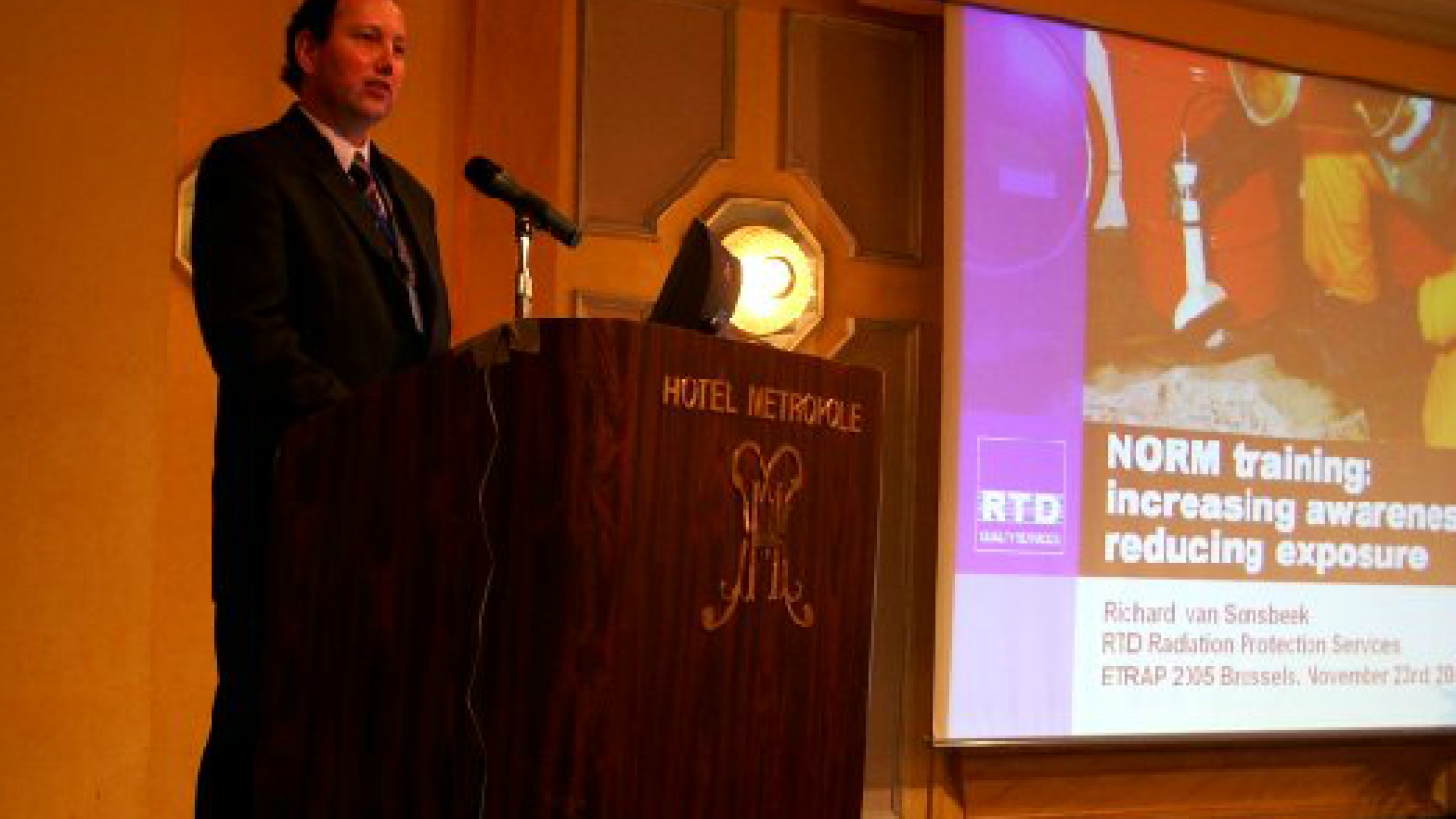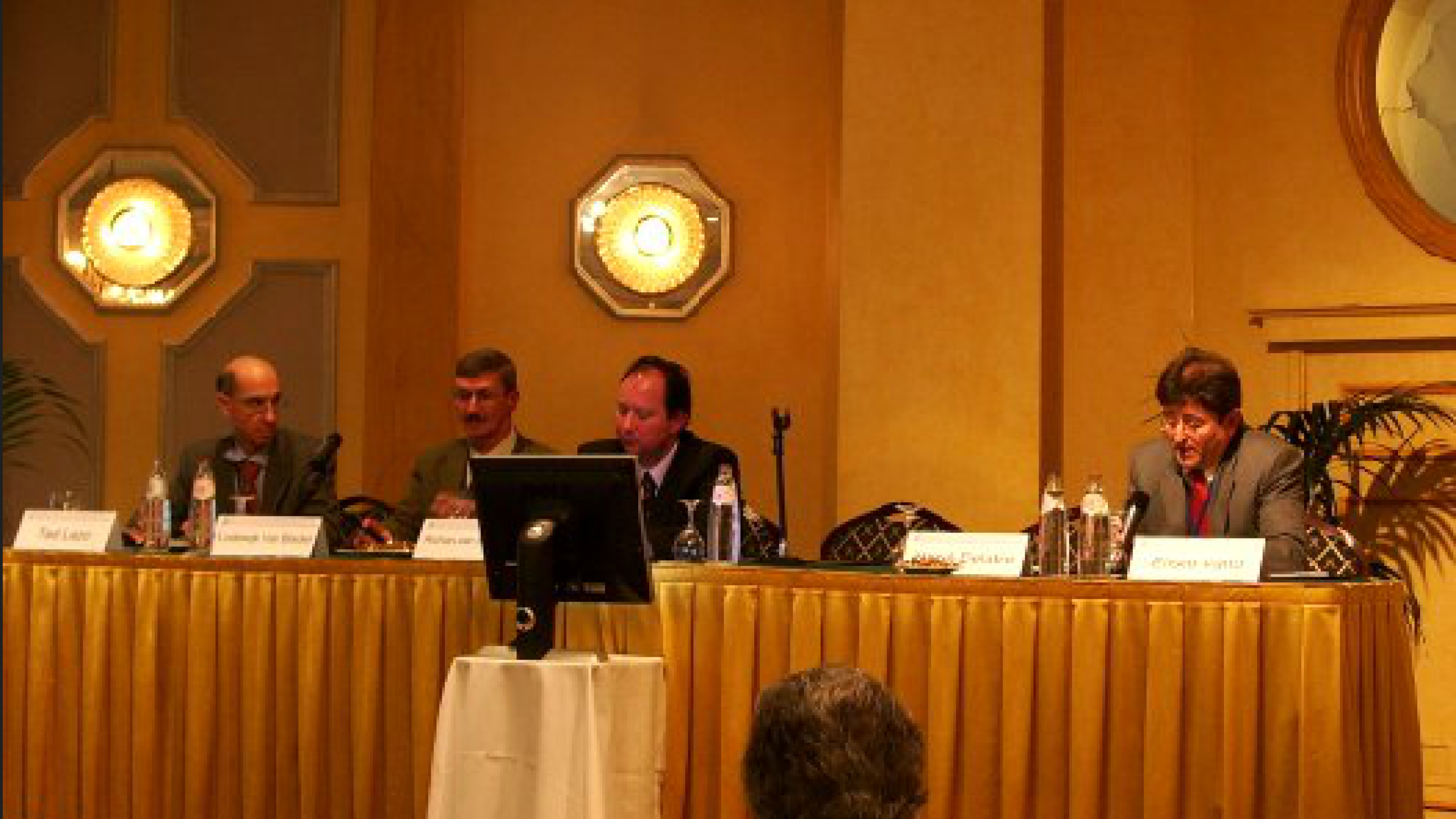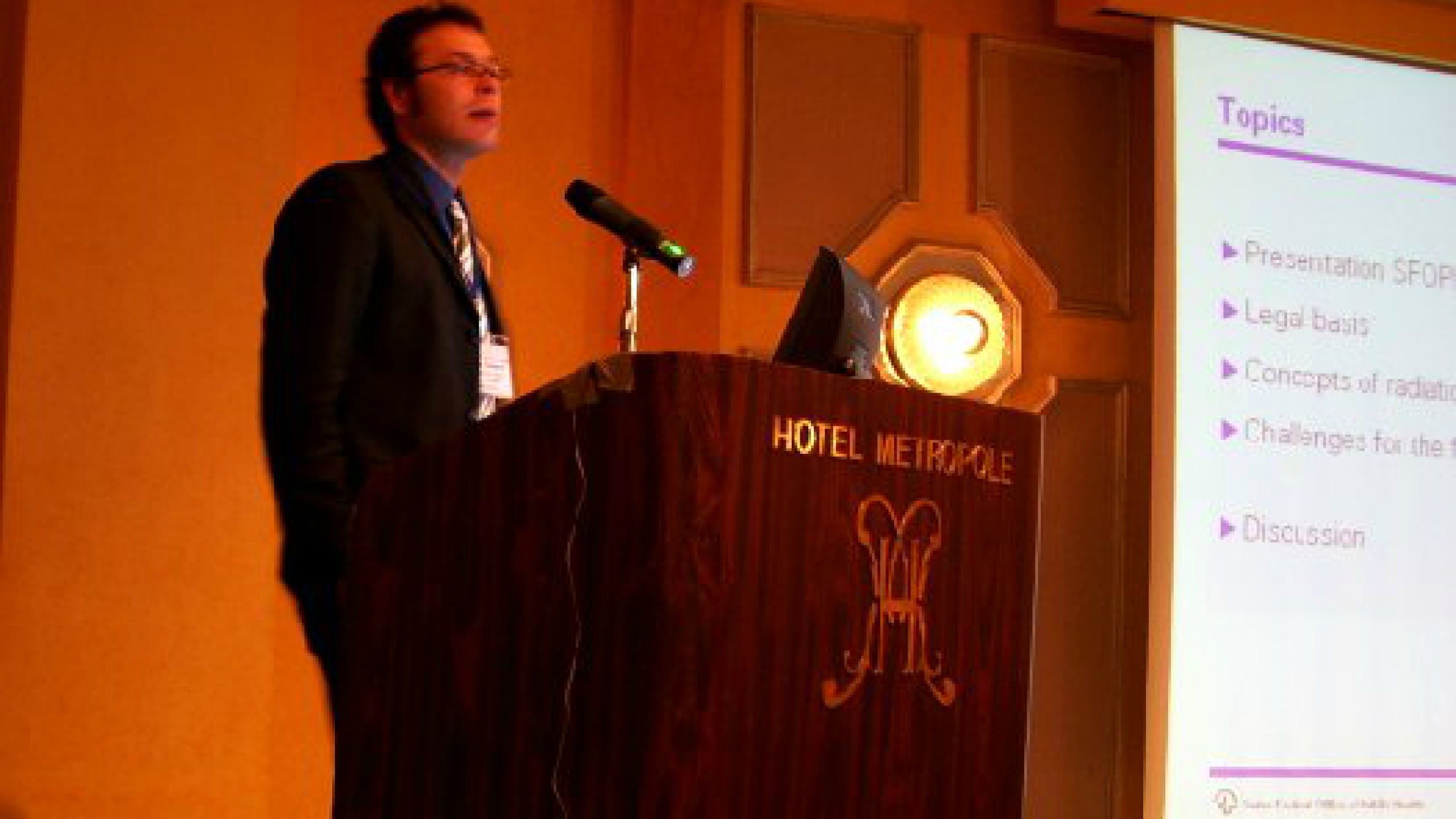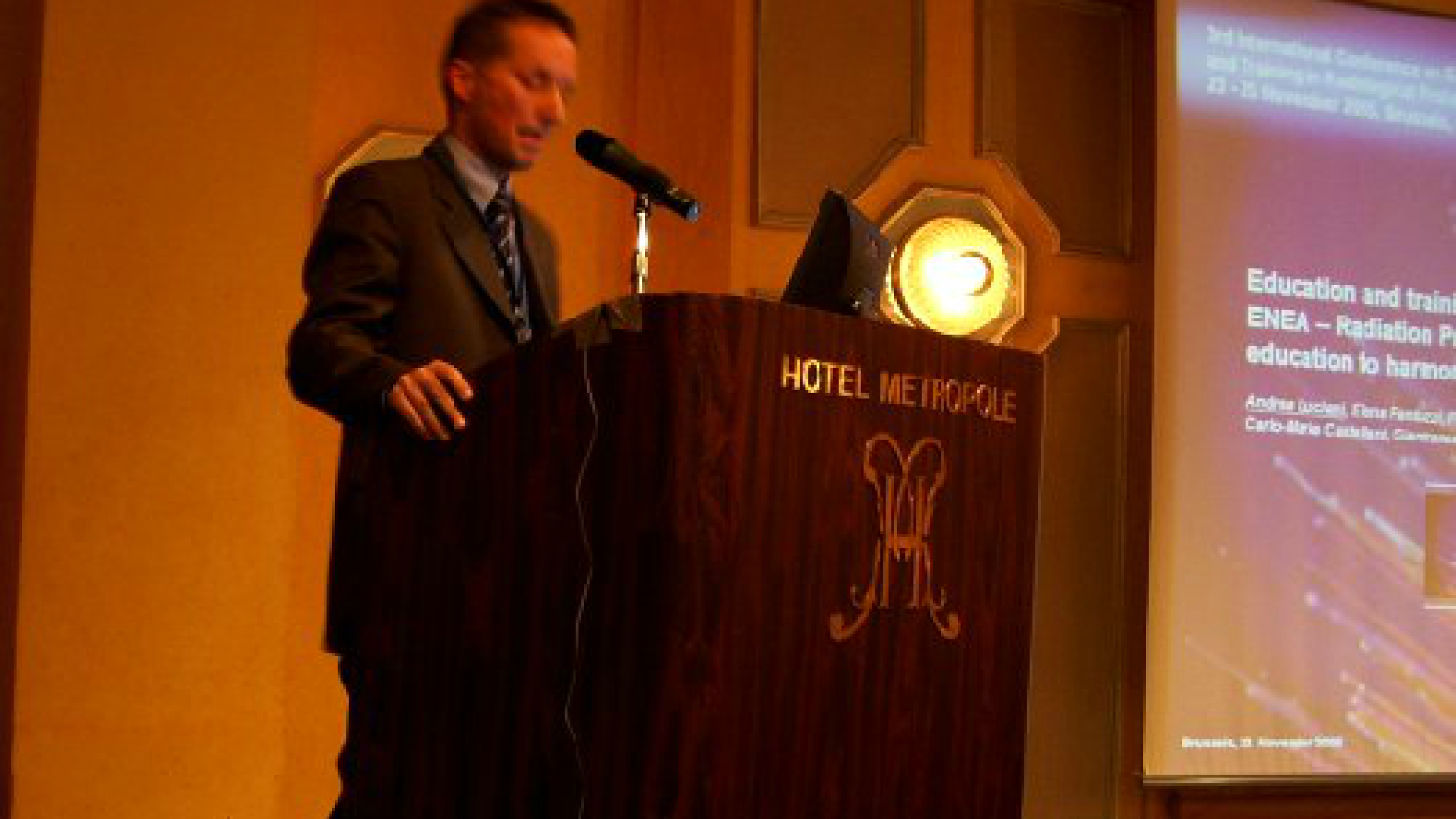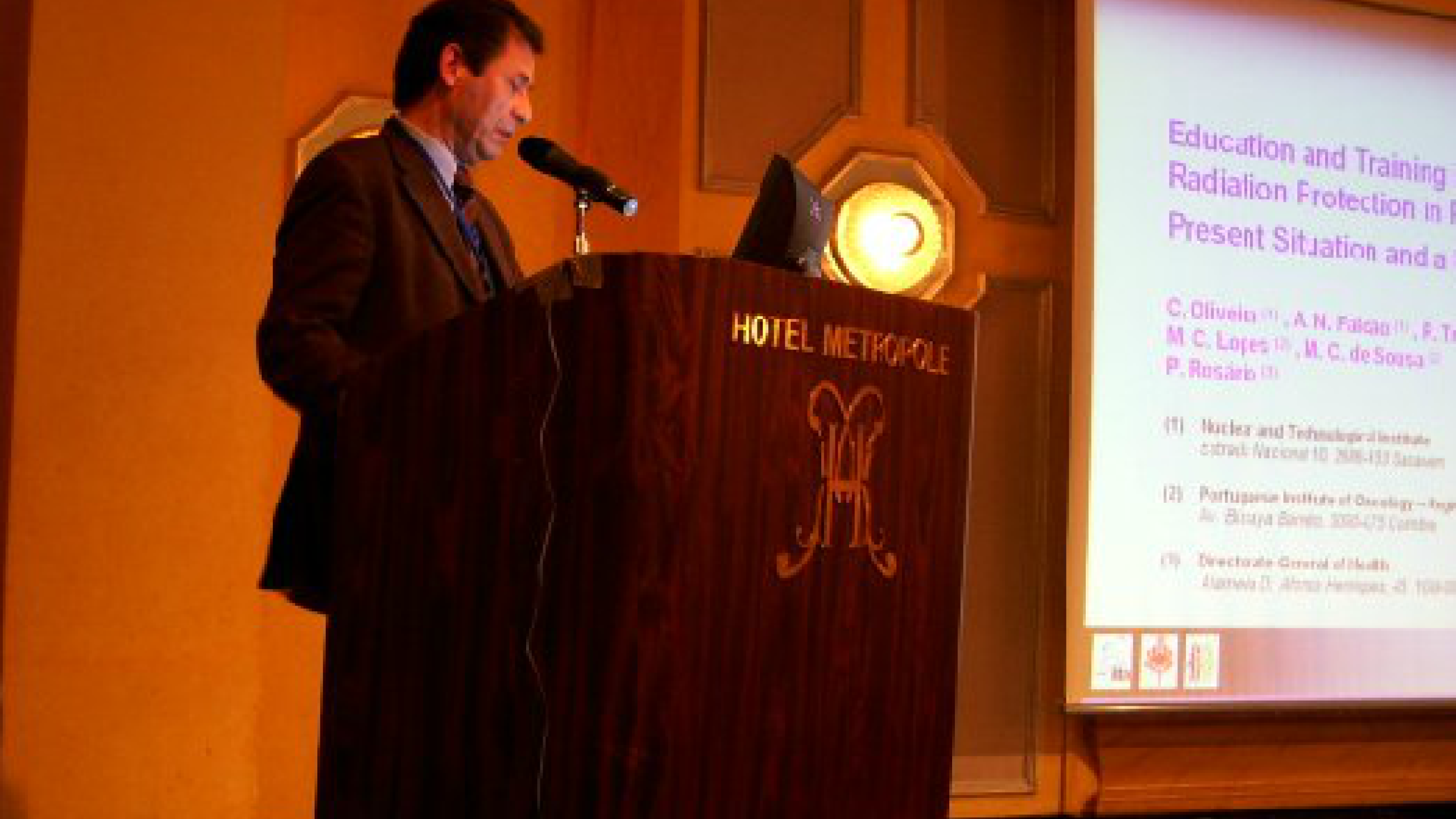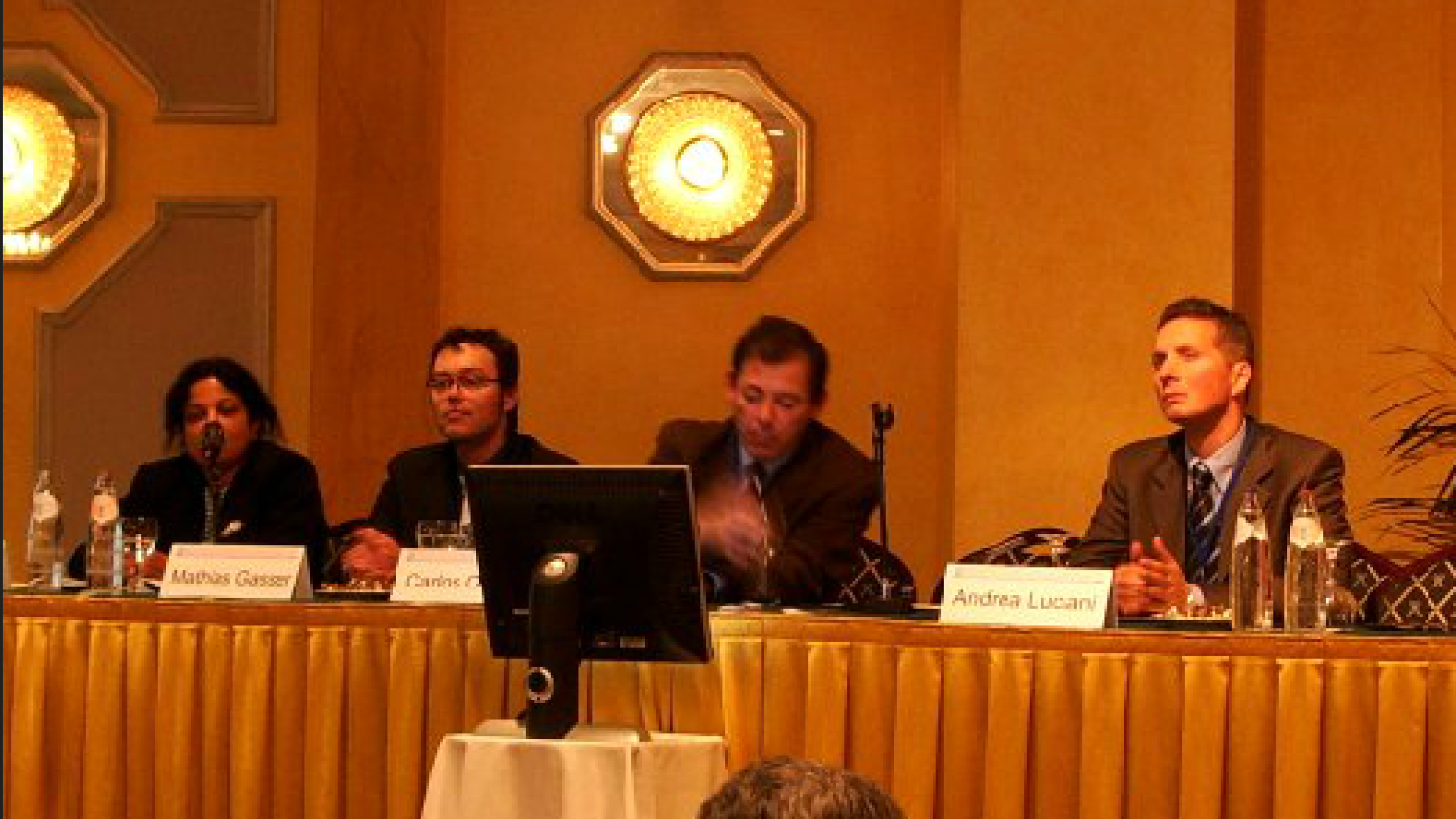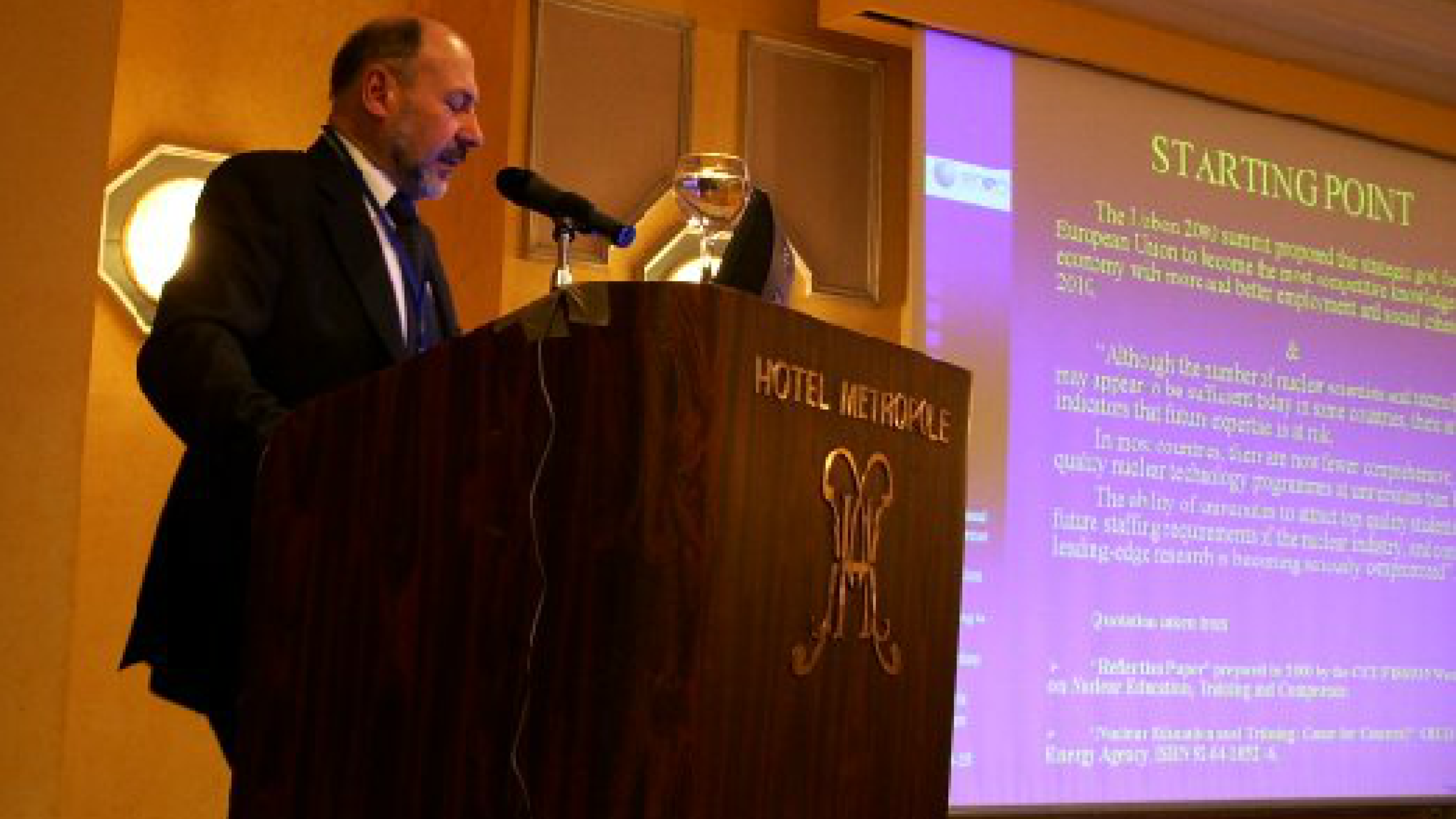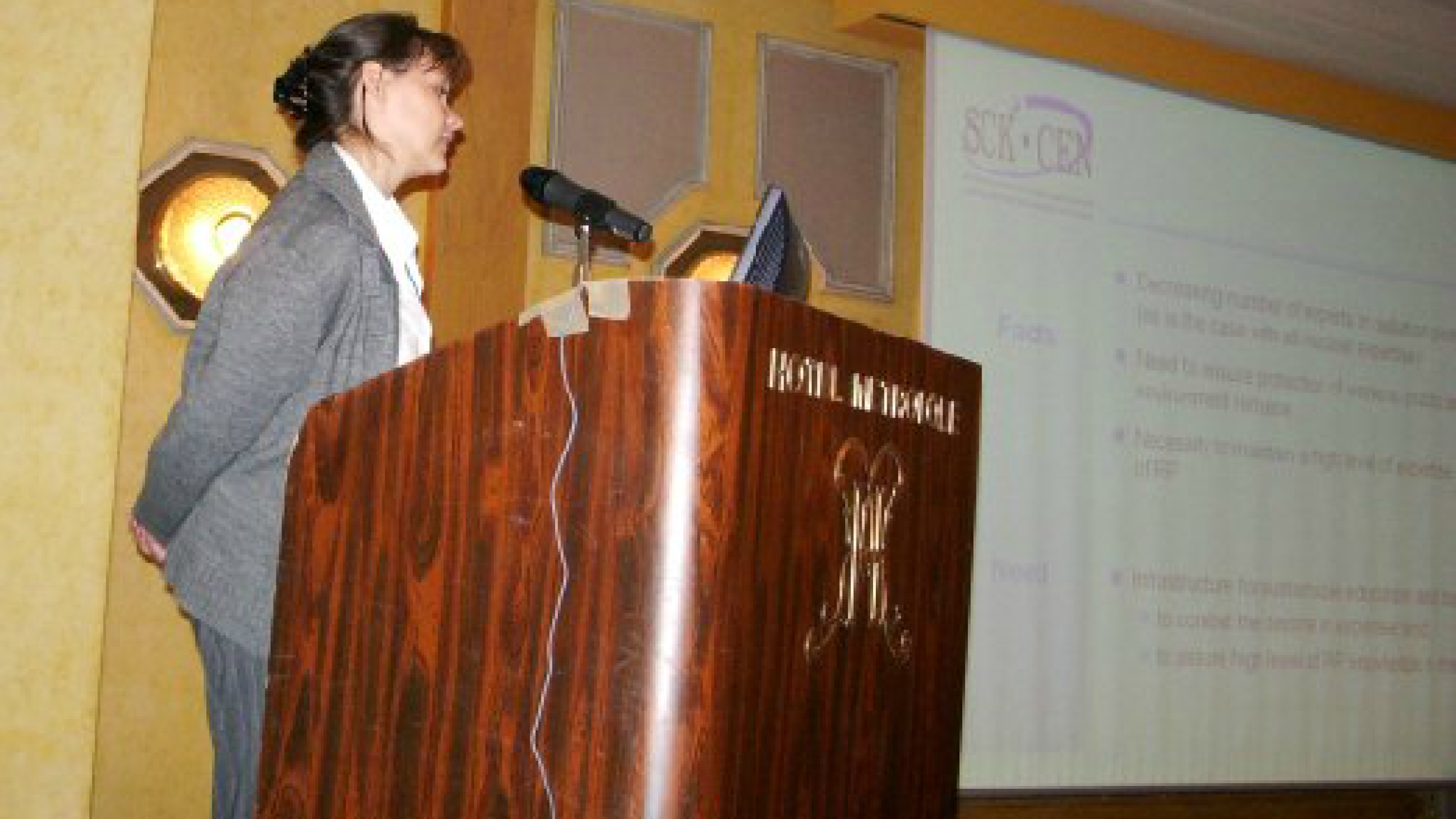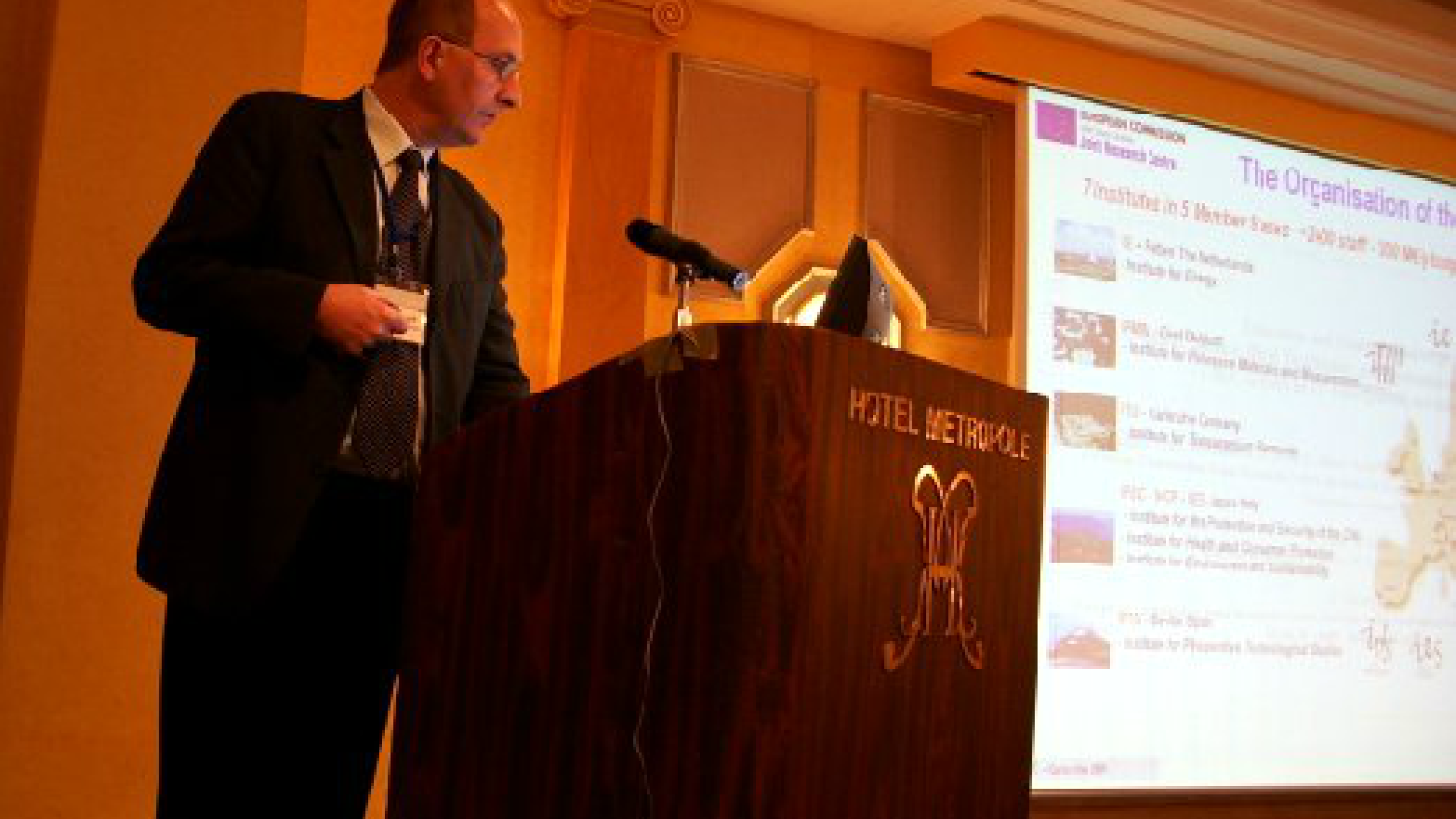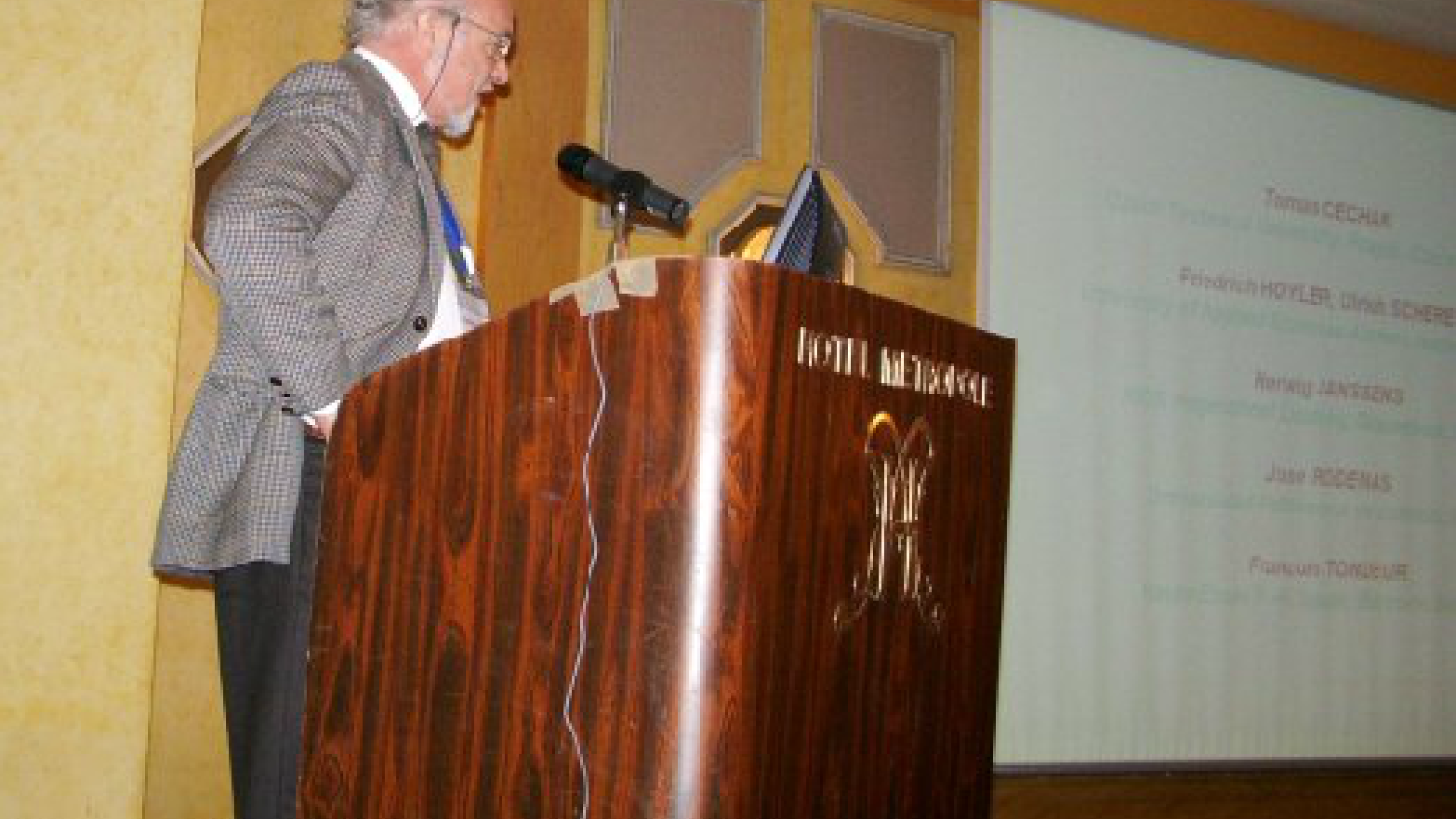ETRAP 2005
3rd International Conference on Education and Training in Radiological Protection
23 - 25 November in Brussels, Belgium
Organised by the Belgian Nuclear Research Centre (SCK•CEN), the European Nuclear Society (ENS) and the Federal Agency for Nuclear Control (FANC).
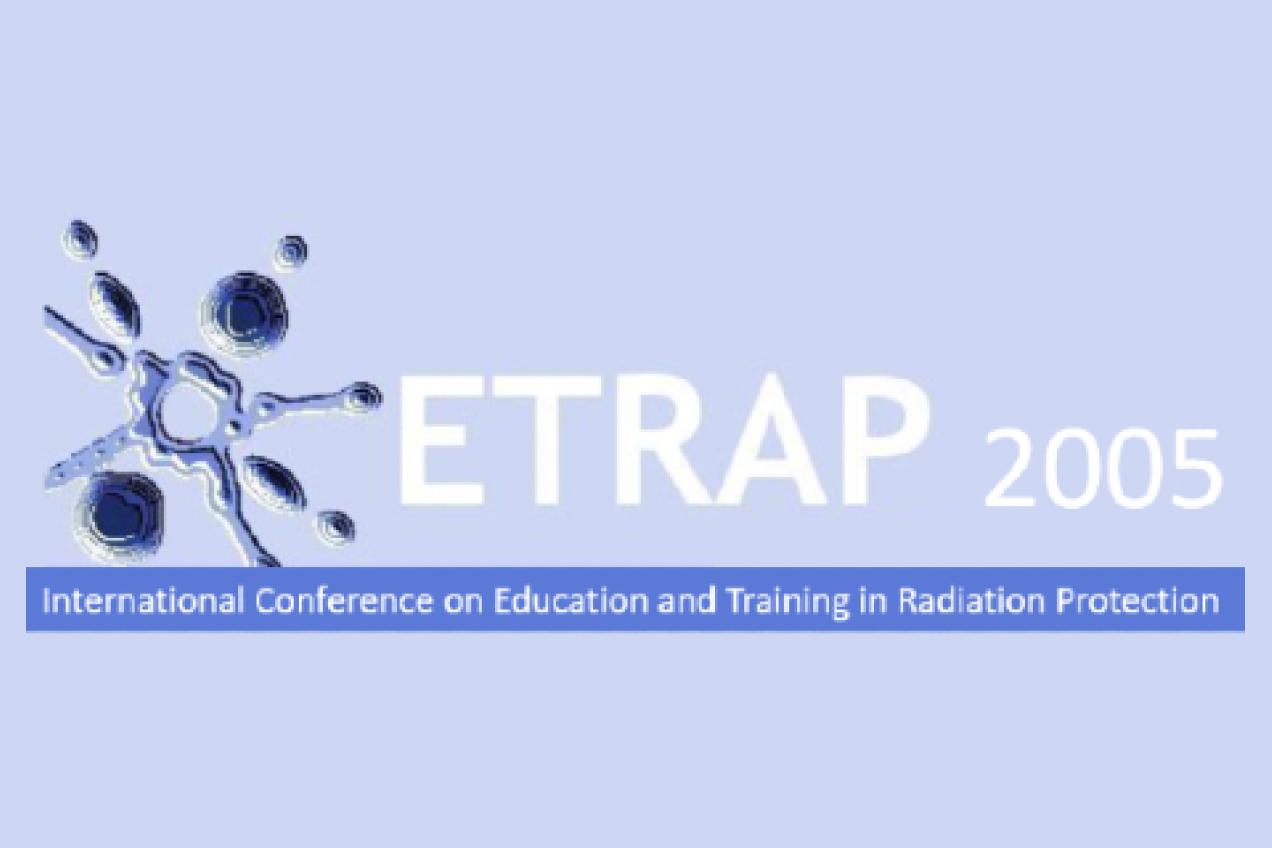
Organisation
-
Paul Govaerts (ETRAP2005 chairman, SCK•CEN - The Belgian Nuclear Research Centre)
Frank Deconinck (ENS - European Nuclear Society)
Chris Huyskens (TU/e - Eindhoven University of Technology)
Augustin Janssens (EC - European Commission)
Ted Lazo (NEA/OECD – Nuclear Energy Agency)
Gaston Meskens (SCK•CEN - The Belgian Nuclear Research Centre)
Geetha Sadagopan (IAEA - International Atomic Energy Agency)
Patrick Smeesters (FANC-AFCN - The Belgian Federal Agency for Nuclear Control)
Jan Van der Steen (NRG - Nuclear Research and Consultancy Group)
Eliseo Vano (UCM - Universidad Complutense Madrid)
Peter van Rijk (UMCU - Universitair Medisch Centrum Utrecht)
Christian Wernli (IRPA - International Radiation Protection Association)
-
Michèle Coeck (SCK•CEN)
Daniel Berger (FANC-AFCN)
Annick Deltenre (FANC-AFCN)
Cindy Verachtert (SCK•CEN)
Gaston Meskens (SCK•CEN)
Hilde Engels (FANC-AFCN)
Guy Lefebvre (FANC-AFCN)
Conference secretariat: Dionne Bosma (ENS)
Programme
Download the ETRAP 2005 programme (pdf).
Documents
-
09:00 - 10:40 International institutions' view and policy
Welcome address
Paul Govaerts - ETRAP2005 Conference Chairman - General Manager SCK•CEN (Belgium)The EU radiation protection training and education strategy
Augustin Janssens - Head of Unit H.4 Radiation Protection DG TREN - European CommissionIAEA education and training activities - past and future - /sites/etrap/files/uploads/ETRAP2005/Presentations/Guibelade-2.pdf(presentation)
Khammar Mrabit - Head Policy & Programme Support Section - Division of Radiation and Waste Safety, International Atomic Energy AgencyIRPA initiatives on education, training and recognition of radiation protection professionals
Christian Wernli - Executive Council member - International Radiation Protection Association11:00 - 12:30 International institutions' view and policy
Towards a European higher education area in radiation protection: a European strategy to ensure quality, mutual recognition and mobility of scientists - (presentation)
Georges Van Goethem - Unit J.4 Nuclear Fission and Radiation Protection DG RTD - European CommissionThe OECD/NEA perspectives on the maintenance of competence: Future challenges for nuclear infrastructures - (presentation)
Takanori Tanaka - Deputy Director for Safety and Regulation - OECD/NEA14:00 - 15:40 E&T needs (bottom up view & countries' perspectives) - 1
Spanish requirements in radiological protection training for the practice of interventional radiology - a five years experience
Eliseo Vano - Head of Medical Physics Group - Radiology Service, Complutense University Madrid (Spain)A radiation protection guide for the nuclear workers
Hervé Delabre - Project leader of the RP handbook - EDF Generation and Engineering (France)E&T in the frame of nuclear and radiological emergency preparedness: Belgium’s experience and future plans
Lodewijk Van Bladel - Head of Medical Applications Control Office - Federal Agency for Nuclear Control (Belgium)NORM training: increasing awareness, reducing exposure - (presentation)
Richard van Sonsbeek - Manager - Röntgen Technische Dienst bv, Department Radiation Protection Services (The Netherlands)16:00 - 17:40 E&T needs (bottom up view & countries' perspectives) - 2
The Swiss concept for the education in radiological protection in the medical field - (presentation)
Mathias Gasser - Scientific Expert - Swiss Federal Office of Public Health (Switzerland)Education and training activities of ENEA – Radiation Protection Institute: national needs of education to harmonisation and harmonisation of training - (presentation)
Andrea Luciani - Researcher - ENEA Radiation Protection Institute (Italy)Education and training in radiation protection in Portugal: present situation and a project for the future - (presentation)
Carlos Oliveira - Head of Department of Radiological Protection and Nuclear Safety - Instituto Tecnologico e Nuclear (Portugal) -
09:00 - 11:00 - International E&T initiatives
The role of the European Nuclear Education Network association (ENEN) in the academic and industrial environment
Peter De Regge - Secretary General of the ENEN Association - ENEN (France)The establishment of a European Network on Education and Training in Radiological Protection (ENETRAP) - (presentation)
Michèle Coeck - ENETRAP Project leader - SCK•CEN (Belgium)Nuclear science education and training courses on radioactivity and radiation protection - A JRC activity in EU enlargement and integration - (presentation)
Joseph Magill - Head of Advanced Nuclear Studies - EC Joint Research Centre / ITE (Germany)Sharing the access to big nuclear facilities for safety training: experience of an Erasmus intensive programme - (presentation)
François Tondeur - Professor - Haute Ecole Paul-Henry Spaak (Belgium)Initiation of a European Platform on Training and Education in Radiation Protection (EUTERP Platform)
Jan van der Steen - Manager Radiation and Environment - NRG (The Netherlands)11:20 - 11:40 Presentation of an overview of the ETRAP2005 posters (link)
11:40 - 12:30 ETRAP2005 plenary session on the conference declaration
Presentation of the discussion document for the conference declaration
Patrick Smeesters - Radiation Protection Adviser - Federal Agency for Nuclear Control (Belgium)Plenary discussion on key themes related to E&T needs and harmonisation, to be presented in the conference declaration. Session facilitated by the moderator and triggered by two speakers:
Alberto Del Guerra - President of the European Federation of Organisations for Medical Physics
Bertrand Barré - President of the European Nuclear Society; Director of Research & Development - COGEMA14:00 - 15:40 Certification / accreditation / recognition - 1
The UK’s experience of setting up a recognition system for Qualified Experts
Laurence Evans - Policy Advisor - Nuclear International and RP Policy Department, The Health and Safety Executive Health and Safety Executive (UK )The qualified expert : competences, training and experience requirements - (presentation)
Pierre Kockerols - Qualified Expert - EC Joint Research Centre IRMM (Belgium)Certification of industrial radiography operators in Norway - (presentation)
Tor Wøhni - Norwegian Radiation Protection Authority (Norway)Legal Requirements for Radiation Protection Training in Germany - (presentation)
A. Schmitt-Hannig - Bundesamt für Strahlenschutz (Germany)16:00 - 17:40 - Training & education tools
Towards a mobile learning pedagogy in radiation protection - (presentation)
Edward Waller - Associate Professor in Radiation Science - University of Ontario Institute of Technology (Canada)Spanish educational web site on radiation protection nuclear medicine course - (presentation)
Marisa Marco - Specialist in Radiation Protection Training, Head of Unit Virtual Centre for Distance Learning - CIEMAT (Spain)The use of computer simulations in specific job training, risk communication and safety - (presentation)
Fernand Vermeersch - Scientific collaborator - Safety Department SCK•CEN (Belgium)European multimedia course for training on radiation protection for interventional radiology - (presentation)
Eduardo Guibelalde - Professor Medical Physics - Dept. of Radiology, University Complutense of Madrid (Spain)Computer based training application for NPP Cernavoda - (presentation)
Mihail Ceclan - Head of Laboratory for Thermal and Fluid Treatment Equipment - Politehnica University of Bucharest (Romania)Development of an active learning methodology for a course of radioactive contamination in an engineering higher school - (presentation)
José Ródenas - Professor of Nuclear Engineering - Department of Chemical and Nuclear Engineering, Polytechnical University of Valencia (Spain) -
09:00 - 10:40 - Certification / accreditation / recognition - 2
Towards a specific education and training programme in radiological protection for practitioners in interventional cardiology - (presentation)
Hubert Thierens - Head of Radiation Protection Department - Ghent University (Belgium)Postgraduade radiation protection training & needs : the University of Surrey model
P.H. Regan - Reader in Nuclear Physics - University of Surrey (UK)Radiation protection programmes for the transport of radioactive materials - (presentation)
W.L. Wilkinson - Consultant - World Nuclear Transport Institute (UK)The relationship between training, competency and suitability - (presentation)
Joanne Stewart - Group leader - Radiation Protection Division, Health Protection Agency (UK)11:00 - 12:40 - The broader perspective
A training program in radiation protection and quality control for radiographers and radiological technologists from developing countries - (presentation)
Harrie Mol - Professor - EHSAL Hogeschool Brussels (Belgium)Stakeholder views on scientific competences needed for future university-trained postgraduates within the field of radiological protection - (presentation)
Christian Tamponnet - Project Leader - IRSN (France)Implementation of the strategy for education and training in radiation protection and waste safety - towards sustainability - (presentation)
Geetha Sadagopan - Training Specialist - Policy & Programme Support Section, Division of Radiation and Waste Safety, International Atomic Energy AgencyA transdisciplinary approach to education and training in radiological protection - (presentation)
Gaston Meskens - Adviser, Applied Systems Analysis and Technology Assessment, PISA (Programme of Integration of Social Aspects into nuclear research) - SCK•CEN (Belgium)12:40 - 13:00 - Closing session
Concluding remarks and presentation of the ETRAP2005 conference declaration
Paul Govaerts - ETRAP2005 Conference Chairman, General Manager SCK•CEN (Belgium) -
P1 Education and training on radiation protection at national and regional levels in Greece
P. DimitriouP2 (Cancelled) International bachelor academic programme in radiation protection for International Sakharov Environmental University and University of South Bohemia
Natalia Gerasimovich, P. Kuna, L. Navrati, I. Pukhtseyeva, N. Prokopenko, A. TimoshchenkoP3 Training and education against illicit trafficking of nuclear materials
Thomas GeringerP4 Romanian experience in education in nuclear engineering and future developments towards an European integrated approach
Petre Ghitescu, Nineta Ghizdeanu, Octavian Dragusin, Niculae MihailescuP5 Encouraging the assistance to courses on radiation protection in one medical school
J. Hernandez-Armas, F. Hernandez, A. Catalan and JC. Fdez-AldecoaP6 Experiences from training courses of National Committee for implementation of QA in radiology in Slovakia
M. Horváthová, D. NikodemováP7 Education and training of the radiation expert in Belgium
Herwig Janssens, François Tondeur, Michèle Coeck, Antoine DebaucheP8 Test-control of knowledge of participants of regional PGEC course on radiation protection and safety of radiation sources in ISEU, Minsk, Belarus
E. Khadzhinov, A. Timoshchenko, N. TushinP9 Education and training: common needs and regional solutions
M H Kharita and I. OthmanP10 (Cancelled) Practical methods used for the cultivation of radiation protection at the training reactor, VR-1 SPARROW
Antonín KolrosP11 (Cancelled) One-year experience on the implementation of the new slovenian regulation on radiation protection training
Matjaz KozeljP12 Radiological education and training in former Soviet Union countries
Semyon Kundas, J. Sabol, A. TimoshchenkoP13 SCK•CEN's international school for Radiological Protection (isRP): Communicating the aspects of radiological protection
Isabelle Majkowski, Cindy Verachtert, Michèle CoeckP14 Existing competence and infrastructure in radiation protection training at postgraduate level within the EU and new entrant states
Peter MitchellP15 The training activities of the Center for Advanced Technological and Environmental Training (FTU) of Forschungszentrum Karlsruhe
Siegurd Möbius, Gerhard Frank, Angela BickelP16 BNEN: The Belgian Nuclear Higher Education Network. Your way to the European Master of Nuclear Engineering
Frans MoonsP17 Radiation protection training organised by Paul Scherrer Institute
R. Müller, E. WalderP18 The supervision on radiation protection: The requirements on education and training for radiation protection experts
Hana PodškubkováP19 QUADOS: Quality Assurance in Radiation Protection and Dosimetry - an EU funded CA of framework IV establishing harmonization within Europe
R.A. Price, G. Gualdrini, S. Agosteo, S. Ménard, , J-L. Chartier, B. Großwendt, I. Kodeli, G.P. Leuthold, B.R.L. Siebert, H. Tagziria, R.J. Tanner, M. Terrissoll, M. ZanklP20 Workplace monitoring at the Nuclear Medicine Department of IPOFG-CROL, SA
M. T. Rézio and M. R. VieiraP21 Generation of dose databases for an operator training application in nuclear facilities
J. RodenasP22 Education to a graduated engineer degree in the field of radiation protection in Saxony
Peter SahreP23 ENETRAP: Comparing the scientific content of the IAEA Standard Syllabus to European Requirements
A. Schmitt-Hannig, S. Möbius, A. Bickel, G. Sadagopan, M. WilliamsP24 Is there any need for a mutual recognition of Qualified Experts? First results of an opinion poll
Karl-Ludwig StangeP25 Training in radiation protection and its update in Germany
Barbara StolzeP26 Education and training of leading professionals in radiological protection in The Netherlands
S. van Dullemen, A.J.J. Bos and W.J.C. OkxP27 History of medical dosimetry: Contribution of the Belgian museum of radiology to education
R. Van Loon and R. Van TiggelenP28 Teaching problem solving skills to radiation protection students
Edward J. WallerP29 Training as a vital tool to establish a Quality Management System in atesting laboratory at the International Atomic Energy Agency
J. Zeger, K. Mrabit, R. Cruz-Suarez and P. Deboodt -
ETRAP2005 intended to put forward a declaration with a special focus on certification, harmonisation and efficient organisation of education and training to the relevant national and European institutions, organisations and networks.
During the plenary session on Thursday 24 November 2005, participants focussed on the need for harmonisation of education and training practices and of skill recognition. The debate resulted in a conference declaration that was put forward to national and international policy makers at the end of the conference.
ETRAP 2005 photo gallery

